Business & Management
EfD Launches $30,000 Carnegie CECAP-funded Research Project on Household and SME Energy Efficiency in Uganda
Published
7 months agoon
By
Jane Anyango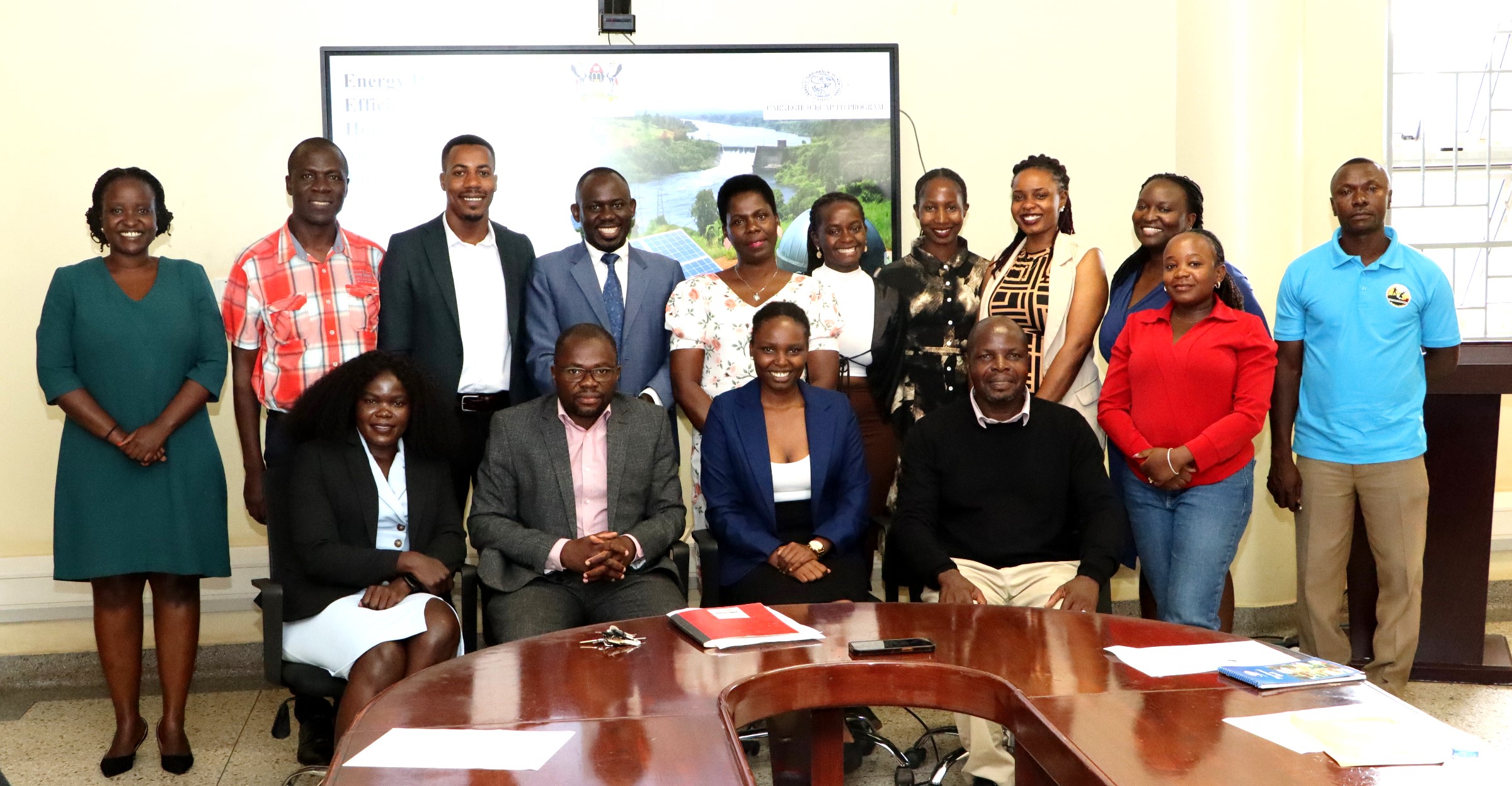
Kampala, Uganda – May 15, 2025
The Environment for Development (EfD) initiative at Makerere University has launched a two-year research project aimed at studying energy demand and efficiency among Ugandan households and small and medium enterprises (SMEs). The project, supported by a $30,000 grant from the Carnegie Corporation under the CECAP program, officially kicked off with an inception workshop held at the EfD Mak conference room on Wednesday.
Dr. Peter Babyenda, a postdoctoral researcher and lead investigator on the project, said the study will focus on identifying the key drivers of energy consumption at the household and SME level, particularly within the manufacturing sector. “We are investigating what factors determine energy use—whether it’s charcoal, LPG, or electricity—and how that use can be made more efficient,” he said.
The research is being conducted under the mentorship of Prof. Edward Bbaale, Director of EfD-Mak, and is part of a larger initiative under the Makerere University Directorate of Research and Graduate Training led by Principal Investigator Prof. Buyinza Mukadasi who also serves as Acting Deputy Vice Chancellor (Academic Affairs)
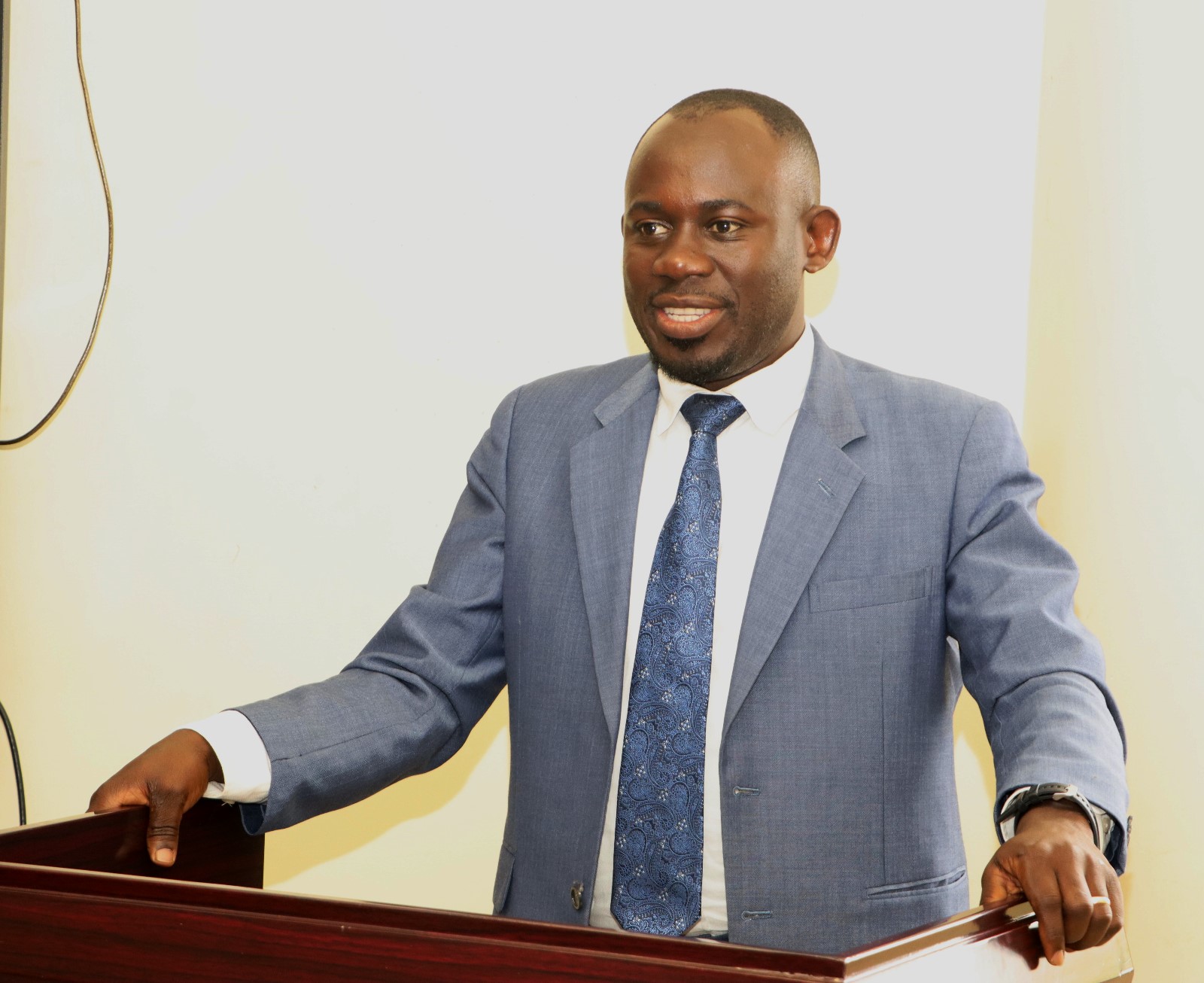
The project aims to provide evidence-based policy and awareness messages to improve energy efficiency in Uganda, amid rising electricity costs and population growth. “The only sustainable way to address rising energy costs is through improved efficiency,” Dr. Babyenda emphasized.
The workshop brought together stakeholders from the Ministry of Energy and Mineral Development, energy engineers, economists, and researchers from institutions such as the Economic Policy Research Centre. Their input is expected to help refine the study tools and shape data collection strategies.
Dr. Babyenda noted that the team will now revise its research instruments based on feedback from the workshop, and submit the tools for ethical review by the CoBAMS Research Ethics Committee. Field data collection is slated to begin in early June.
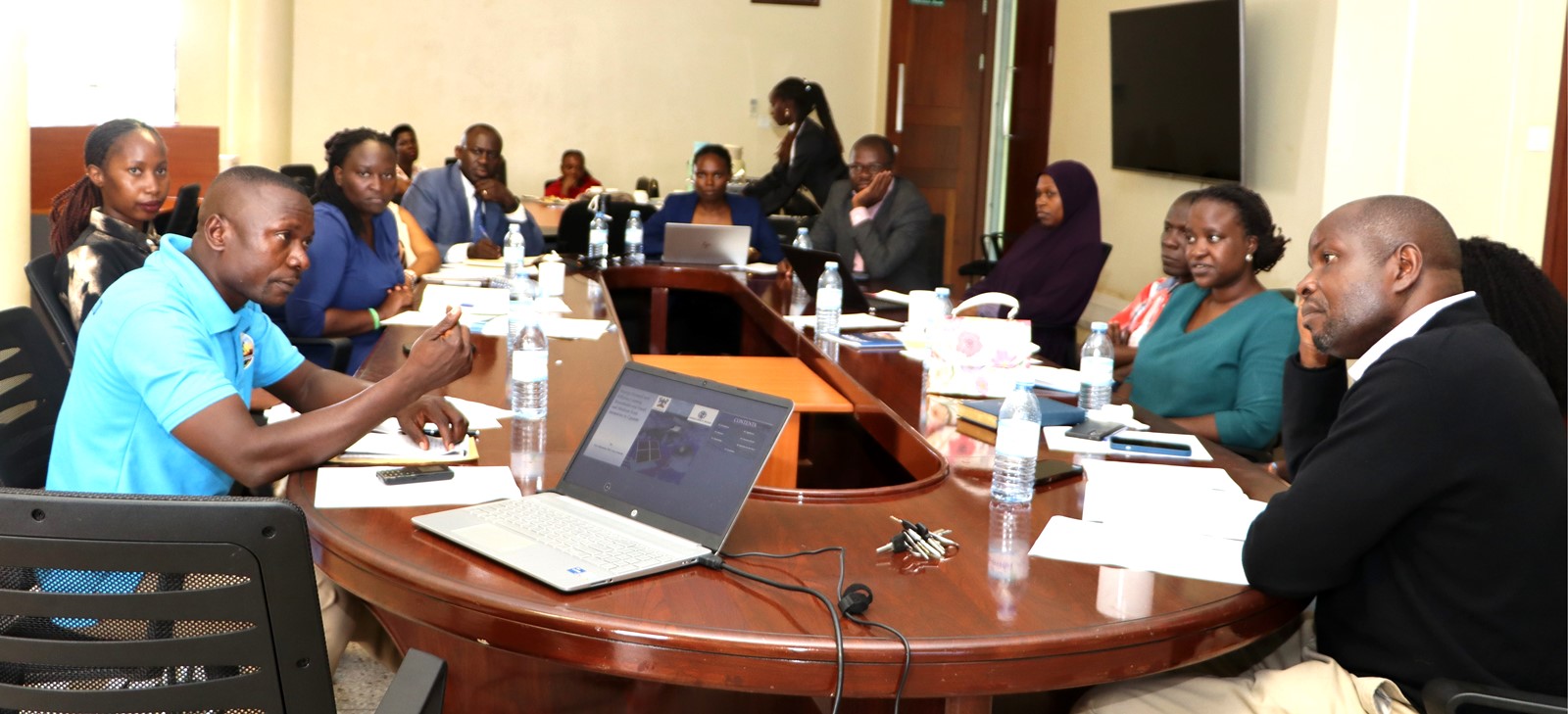
The study, selected through a highly competitive process that saw only 25 projects funded, is expected to culminate in two peer-reviewed publications and a comprehensive report. Dissemination efforts will target both policymakers and end users, including the Ministry of Energy and relevant community stakeholders.
“This project is a milestone for us at EfD-Mak. We are excited to contribute research that has the potential to influence national energy policy,” Dr. Babyenda said.
Dean Calls for Deeper Stakeholder Engagement and Practical Insight
The Dean of the School of Economics at Makerere University, Assoc. Prof. Mike Ibrahim Okumu, called for greater alignment between academic research and practical stakeholder perspectives in energy studies.
Congratulating Dr. Peter Babyenda and his team for securing the $30,000 research grant, Prof. Ibrahim praised the initiative as a reflection of both academic rigor and practical relevance.
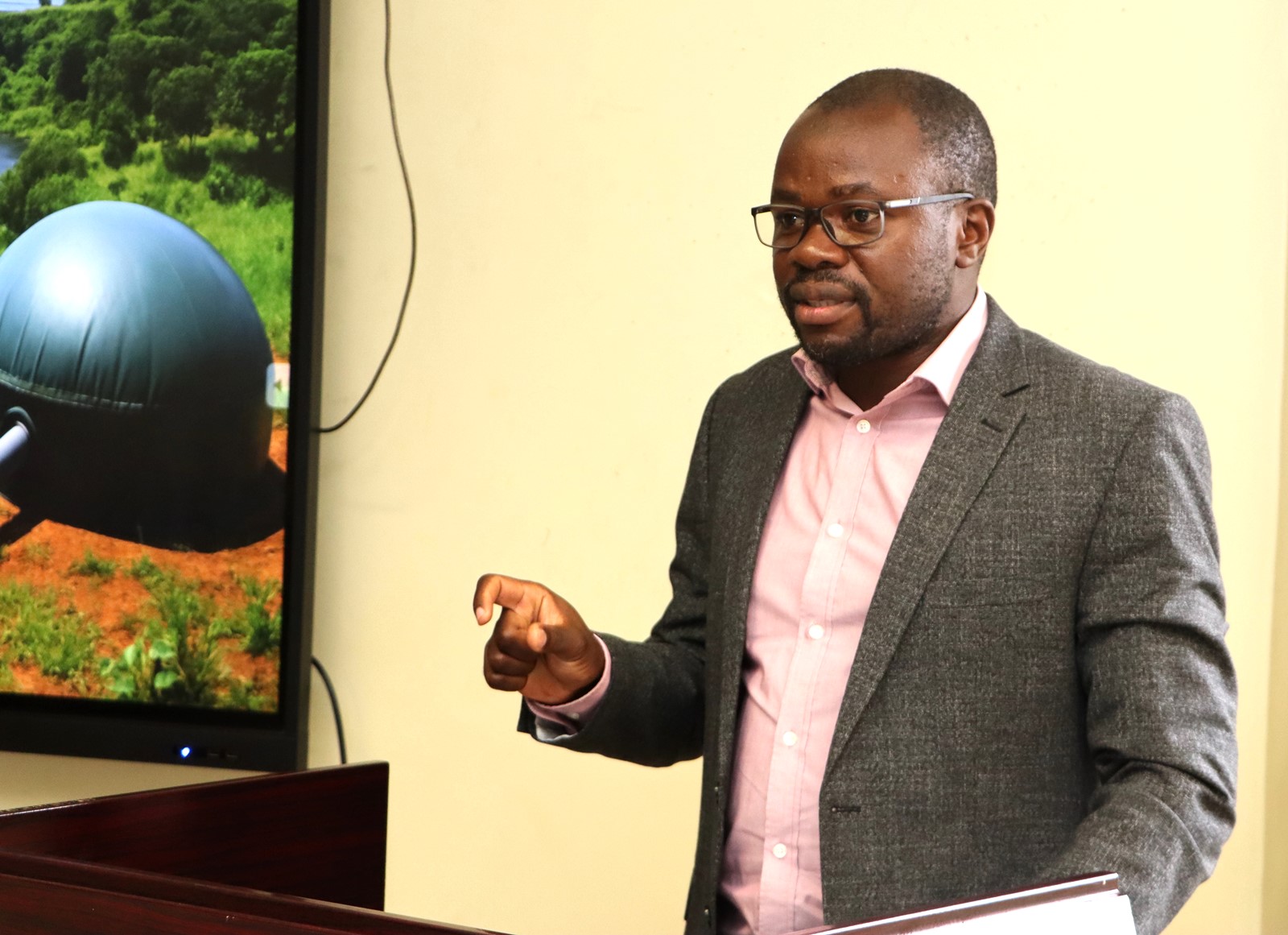
“My understanding of inception workshops is that they are meant to test whether your conceptualization aligns with stakeholder perspectives,” he said. “The quality of feedback you receive depends on the quality of stakeholders you engage.”
Prof. Ibrahim emphasized the importance of engaging engineers in the electricity sector, arguing that understanding operational mechanisms is essential for any discussion on energy efficiency. “Efficiency is not just an economic concept—it’s grounded in how energy systems work, and that’s an engineering issue,” he noted.
He encouraged the research team to use the stakeholder feedback to refine their research tools and conceptual framework. Drawing from personal experience, he recounted how a paper he published in the Policy Review Journal originated directly from stakeholder insights gained during a previous inception workshop.
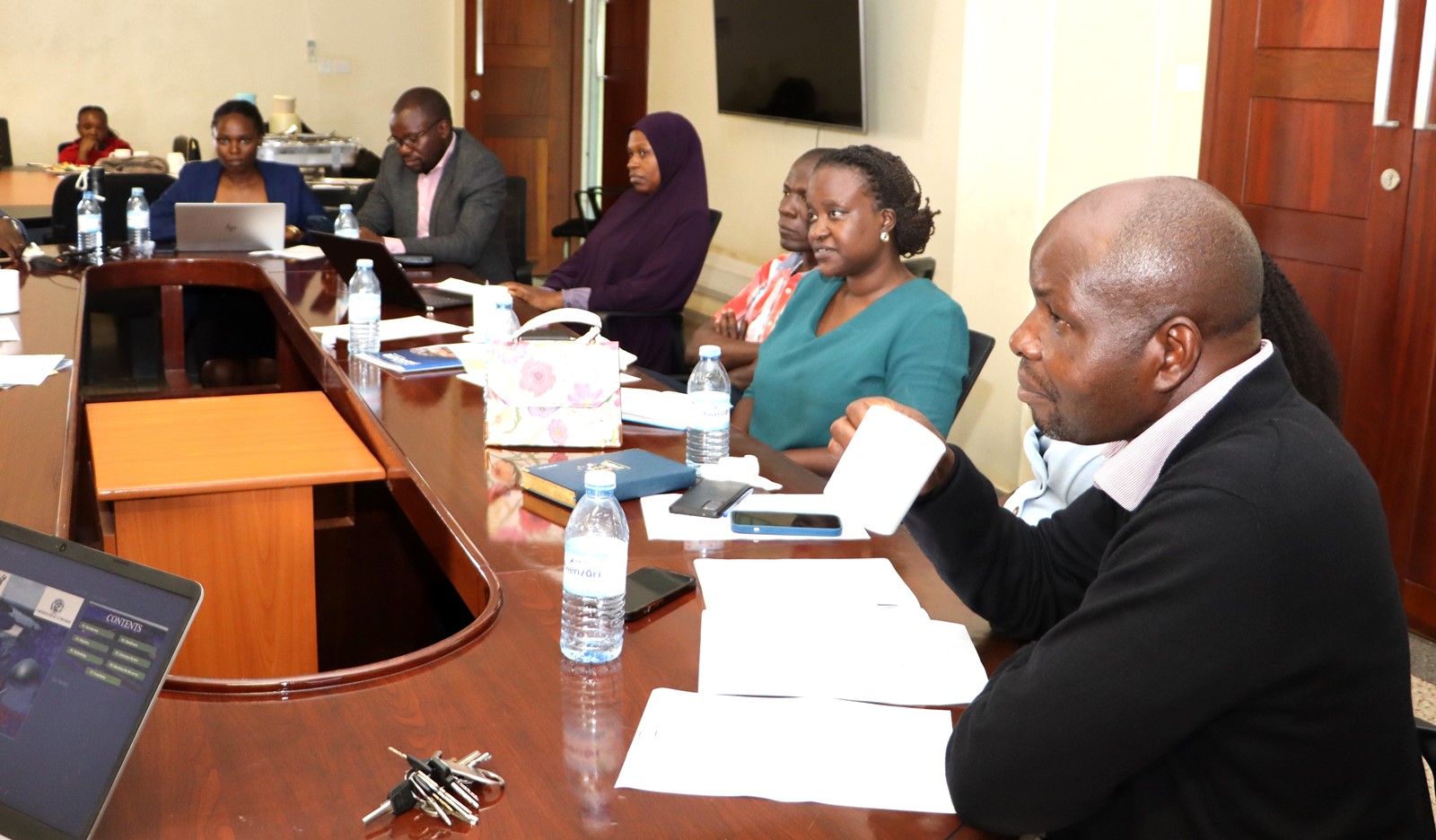
The Dean also stressed the need for inclusive dissemination strategies. “For any research to have real impact, it must involve the end users not just at the point of output but from inception through to delivery,” he said. “If you don’t speak to the people who use the energy, you lose the entire purpose of the research.”
Prof. Ibrahim closed by extending gratitude to all participants and reaffirming the School of Economics’ support for the EfD center. “What we’ve earned today are not just discussions, but deep mental insights that will shape this project going forward,” he concluded.
Participants Urge Deeper Energy Awareness and Policy Integration
Key stakeholders from government and academia called for enhanced public awareness and integrated energy policies
Esther Fiona Atek, an Energy Officer from the Ministry of Energy and Mineral Development, underscored the ministry’s interest in the project findings. “While we know how much residences consume, we’re particularly interested in how that breaks down between rural and urban areas, and within specific uses like cooking and lighting,” Atek said. “The research will inform future policies to promote energy-efficient technologies both in households and SMEs.”
Atek emphasized the study’s potential to support the ministry’s mandate to drive energy efficiency in the residential, commercial, and agricultural sectors. She highlighted the need for disaggregated data that can guide technology promotion and tailor interventions to actual consumption patterns.
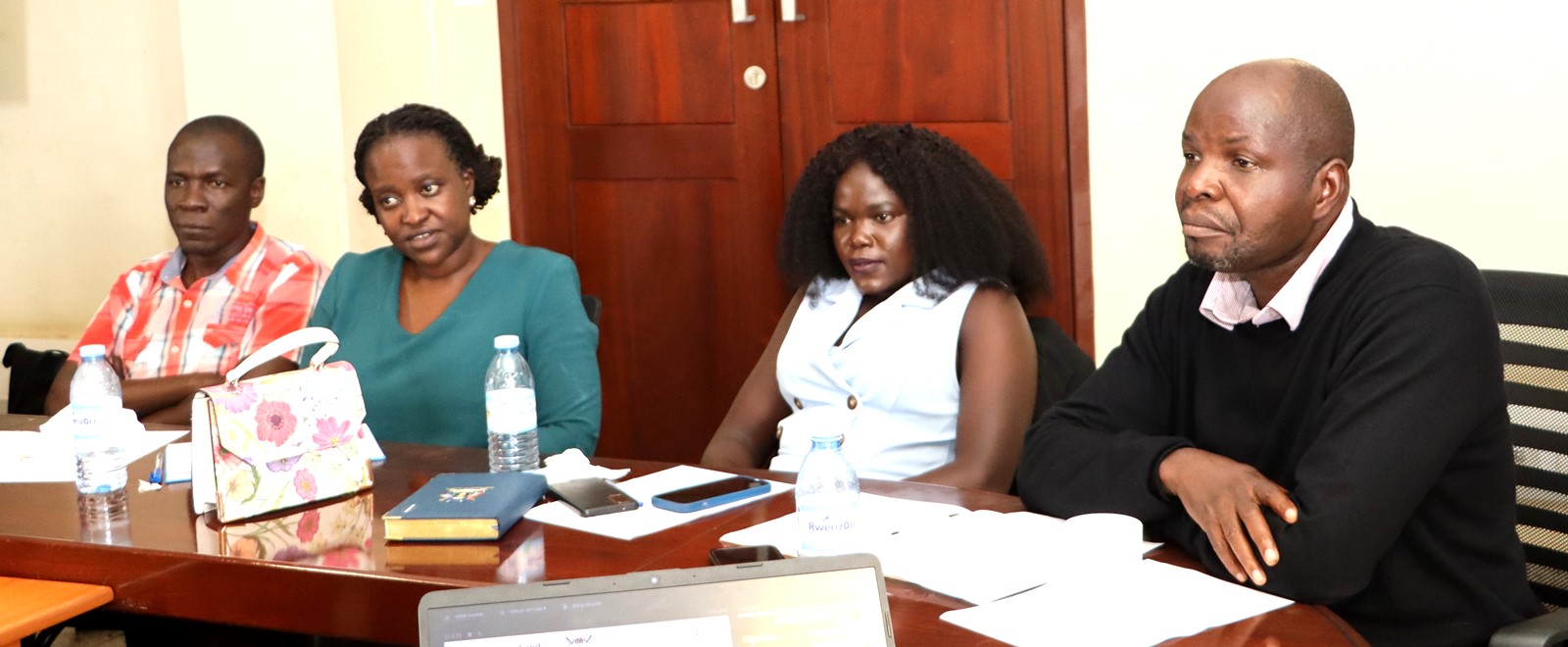
Meanwhile, Dr. Abubaker Matovu Wasswa, Head of the Department of Electrical and Computer Engineering at Makerere University, called for broader public education on energy types and uses. “People often limit solar energy to lighting, yet it can do so much more. We must understand the different forms of energy—biomass, petroleum, LPG, solar—and how each can be used efficiently,” he said.
Dr. Wasswa stressed that energy sustainability requires a cultural shift in how Ugandans perceive and utilize various energy sources. “If we don’t educate users on energy efficiency across all forms, we risk wasting valuable resources and missing out on long-term sustainability,” he warned.
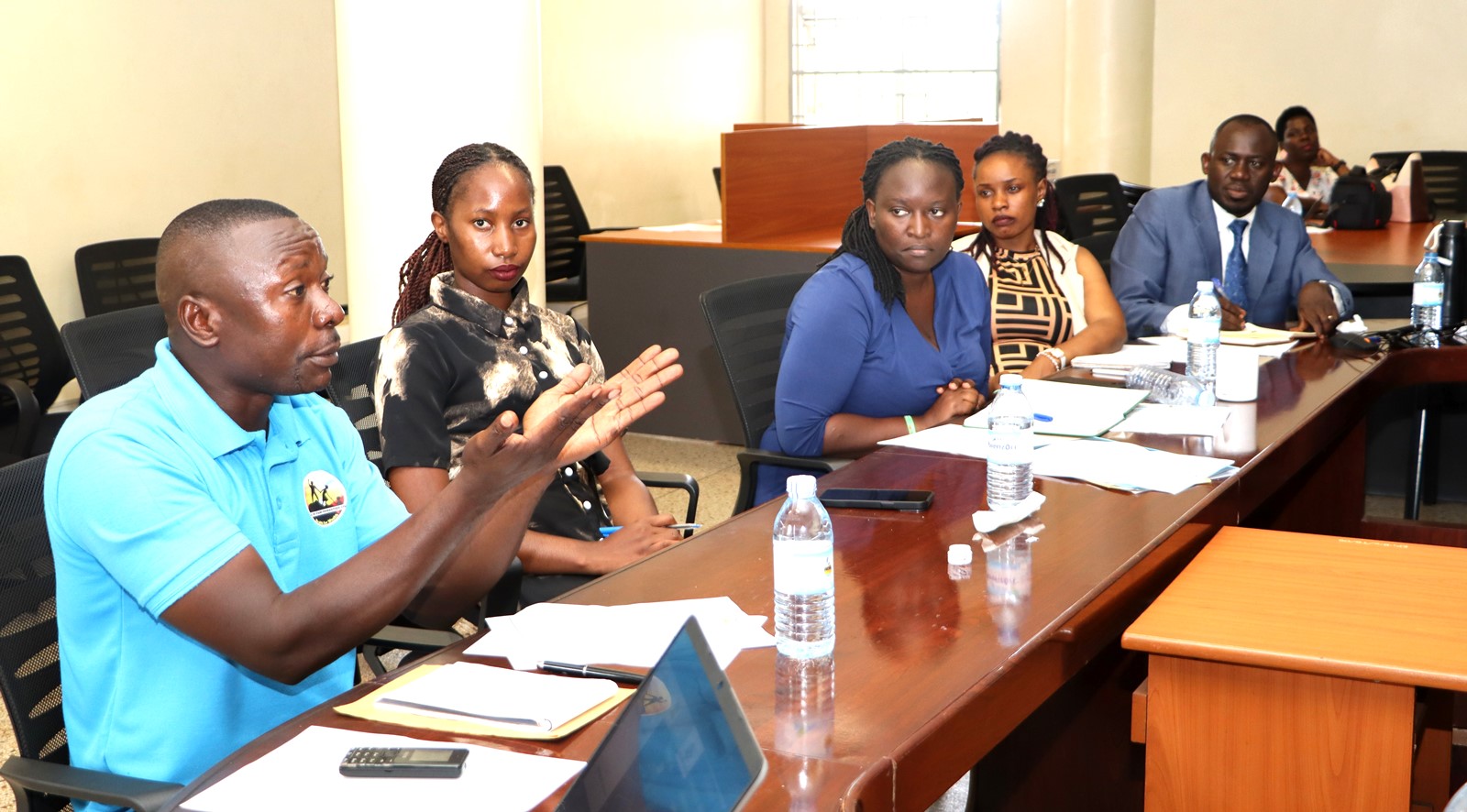
The EfD-led research project aims to provide actionable data and recommendations to improve energy efficiency across Uganda. Fieldwork is expected to begin in June 2025, with findings set to influence national policy discussions and promote smarter energy use in households and manufacturing enterprises.
Jane Anyango is the Communication Officer EfD Uganda
You may like
-
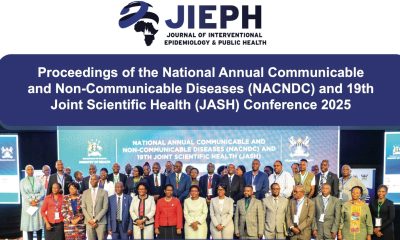

Proceedings of the National Annual Communicable and Non-Communicable Diseases and 19th Joint Scientific Health Conference 2025
-
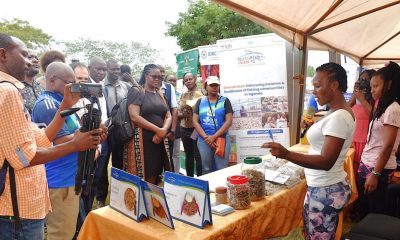

Jinja Fish Festival: Mak Recognized for its outstanding contribution to the Development of the Fisheries Sector
-
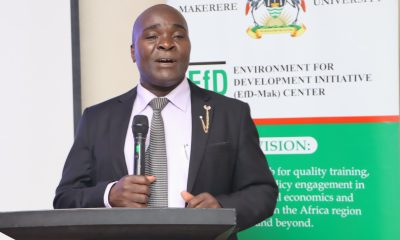

EfD, MDAs & Private Sector Strategize on Scaling up the Adoption of Climate Smart Agriculture in Uganda
-


Call For Expression of Interest: WEE-DiFine Research Initiative
-


CoBAMS Working Paper Series 2025
-


Trees That Still Give Shade: Celebrating the Life and Impact of Prof. Tumusiime-Mutebile
Business & Management
EfD, MDAs & Private Sector Strategize on Scaling up the Adoption of Climate Smart Agriculture in Uganda
Published
5 days agoon
December 5, 2025By
Jane Anyango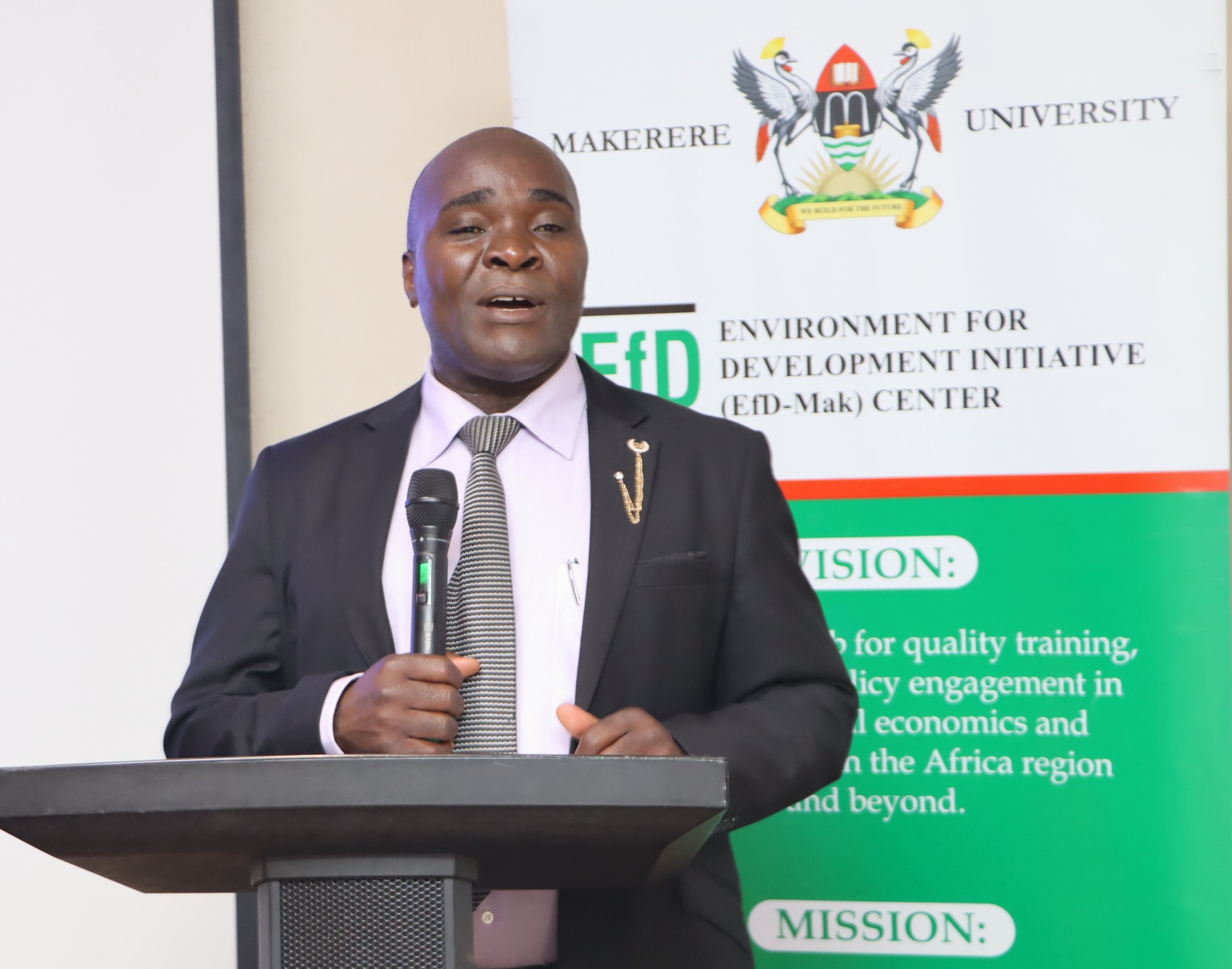
Researchers, government officials and private sector actors convened in Kampala to draw a roadmap for accelerating the adoption of Climate Smart Agriculture (CSA) as Uganda struggles with rising climate shocks, stagnating agricultural productivity and worsening poverty levels.
The high-level annual workshop, held on December 4, 2025 at the Sheraton Kampala Hotel, was organised by the Environment for Development (EfD) Mak Centre through its regional Inclusive Green Economy (IGE) Programme. The initiative seeks to strengthen links between research and policy, improve knowledge uptake, and identify long-standing barriers limiting CSA adoption in Uganda.
The annual IGE transformation initiative requires public servants to demonstrate how they can translate training into practical solutions. This year’s focus is on advancing CSA as a vehicle for sustainable production, poverty reduction, gender inclusion and resilience across agricultural value chains.
The meeting brought together stakeholders from key ministries including Agriculture, Finance, and Water, Tourism along with researchers, academia, private sector suppliers of solar-powered irrigation technologies, civil society, farmers’ representatives and the media., with discussions focused on strategies to improve farmer uptake of CSA practices and to ensure the country’s agricultural sector remains a backbone for economic growth.
Uganda’s Agriculture at crossroads
Delivering the keynote address on behalf of the Commissioner, Ministry of Agriculture, Animal Industry and Fisheries (MAAIF), Emmanuel Odeng warned that Uganda’s agricultural sector, long considered the backbone of the economy, is now facing severe setbacks driven largely by climate change and weak investment in resilient food systems.
Odeng noted that agriculture still contributes significantly to Uganda’s development, accounting for 24% of GDP as of 2022/23, 35% of export earnings and employing over 80% of the population. “This sector remains the main pathway to poverty reduction; Uganda cannot develop without agriculture,” he said.
However, he observed that agricultural contribution to the economy has stagnated and, in some cases, declined sharply. GDP contribution has dropped from 34.1% in 2009 to 24% in 2022, a trend he said should alarm policymakers and CSA implementers.
“Yields are decreasing, water sources are reducing, heat waves are rising. Communities are becoming more vulnerable, and many households are slipping back into poverty,” Odeng said.
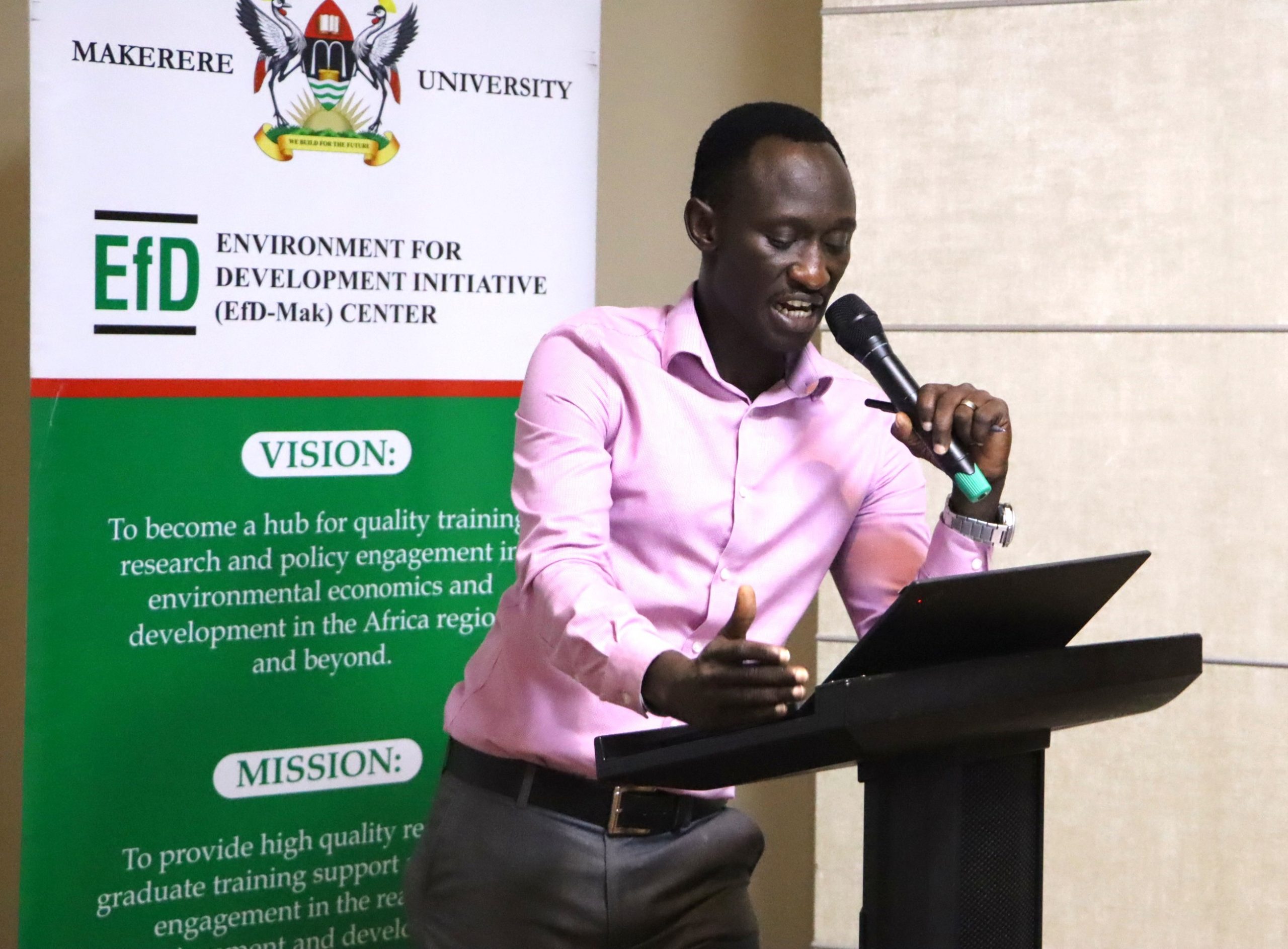
He cited recent statistics showing that while 8.4% of households moved out of poverty, 10.2% slipped back in, resulting in an additional 1.4 million Ugandans falling into poverty between 2019 and 2021.
Climate shocks worsening vulnerability
The keynote highlighted the increasing frequency of climate-related disasters including droughts, floods, landslides and the siltation of major water bodies such as Lake Kyoga as major threats to productivity and food security.
Uganda’s forest cover, wetlands and grazing lands are shrinking rapidly, with more than 6,000 gazetted wetlands facing severe encroachment. Odeng revealed that modelling conducted by the Ministry shows a consistent decline in natural resource size and quality over the last decade.
“There is a strong relationship between natural resource degradation, economic loss and poverty. This vicious cycle must be broken through science-based approaches,” he said.
The Ministry, he added, is working with development partners to deploy dredgers in key water bodies to restore aquatic ecosystems and fisheries, which have been heavily affected by sedimentation.
CSA Seen as the path to recovery
Odeng called for the urgent scaling-up of CSA approaches across crop, livestock and fisheries value chains, emphasising innovations in agroecology and soil rehabilitation, irrigation and water harvesting, mechanisation, climate-resilient seed systems, afforestation and agroforestry and post-harvest management and value addition.
MAAIF aims to increase production across value chains by 40%, anchored on resilient value chains and updated CSA compendiums being developed by the National Agricultural Research Organisation (NARO).
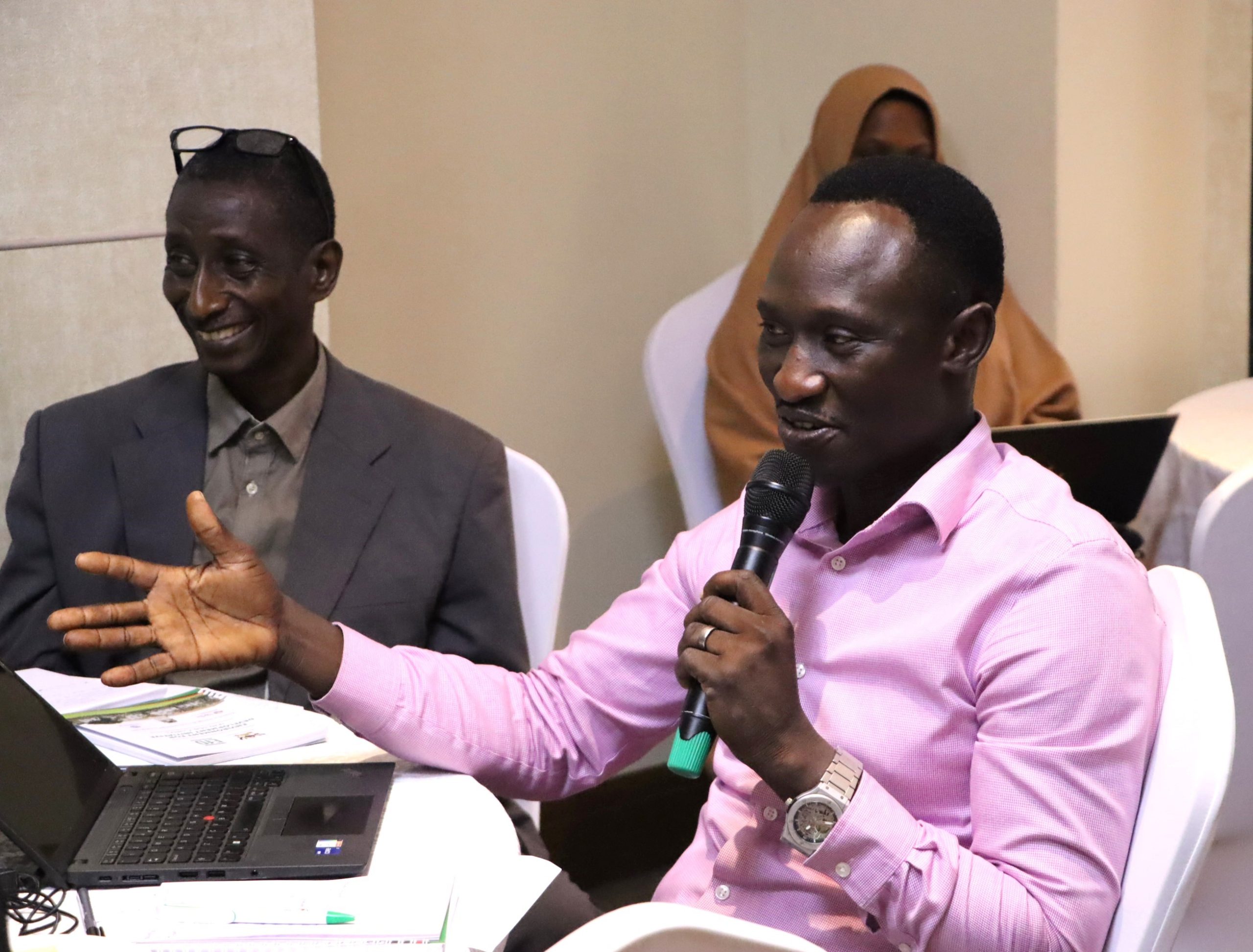
He urged researchers to identify priority areas that can help farmers withstand climate shocks, boost household incomes and support Uganda’s agro-industrialisation agenda under the National Development Plan (NDP).
Odeng tasks stakeholders with three critical questions on boosting CSA adoption
Odeng left participants with three pressing questions that he said must guide Uganda’s CSA agenda. First, he challenged researchers to identify which research areas can practically help farmers build resilience and escape poverty, noting that many households continue to slide back into vulnerability due to climate shocks.
Odeng’s second question focused on productivity, calling on stakeholders to determine which Climate Smart Agriculture approaches are most relevant for raising farmers’ yieldsacrossthe country’s struggling value chains.

His third assignment centred on food security and market losses, urging experts to outline which CSA-related strategies can best improve post-harvest handling, an area he said continues to undermine farmers’ incomes despite increased production efforts.
The three questions, he emphasized, should frame the day’s discussions and guide future policy, research and investment priorities.
“We must ask ourselves: Which resilience-building approaches will help farmers move out of poverty? Which CSA options will sustainably increase productivity? These are the questions we must answer today,” he said.
EfD warns of rising climate risks, calls for stronger research–policy linkage
The Environment for Development (EfD) Mak Centre called for urgent, coordinated action to strengthen CSA as Uganda faces intensifying climate impacts and deteriorating natural resources. Delivering remarks on behalf of the EfD Director, Dr. John Sseruyange urged closer collaboration between researchers and policymakers to address the country’s growing vulnerabilities.
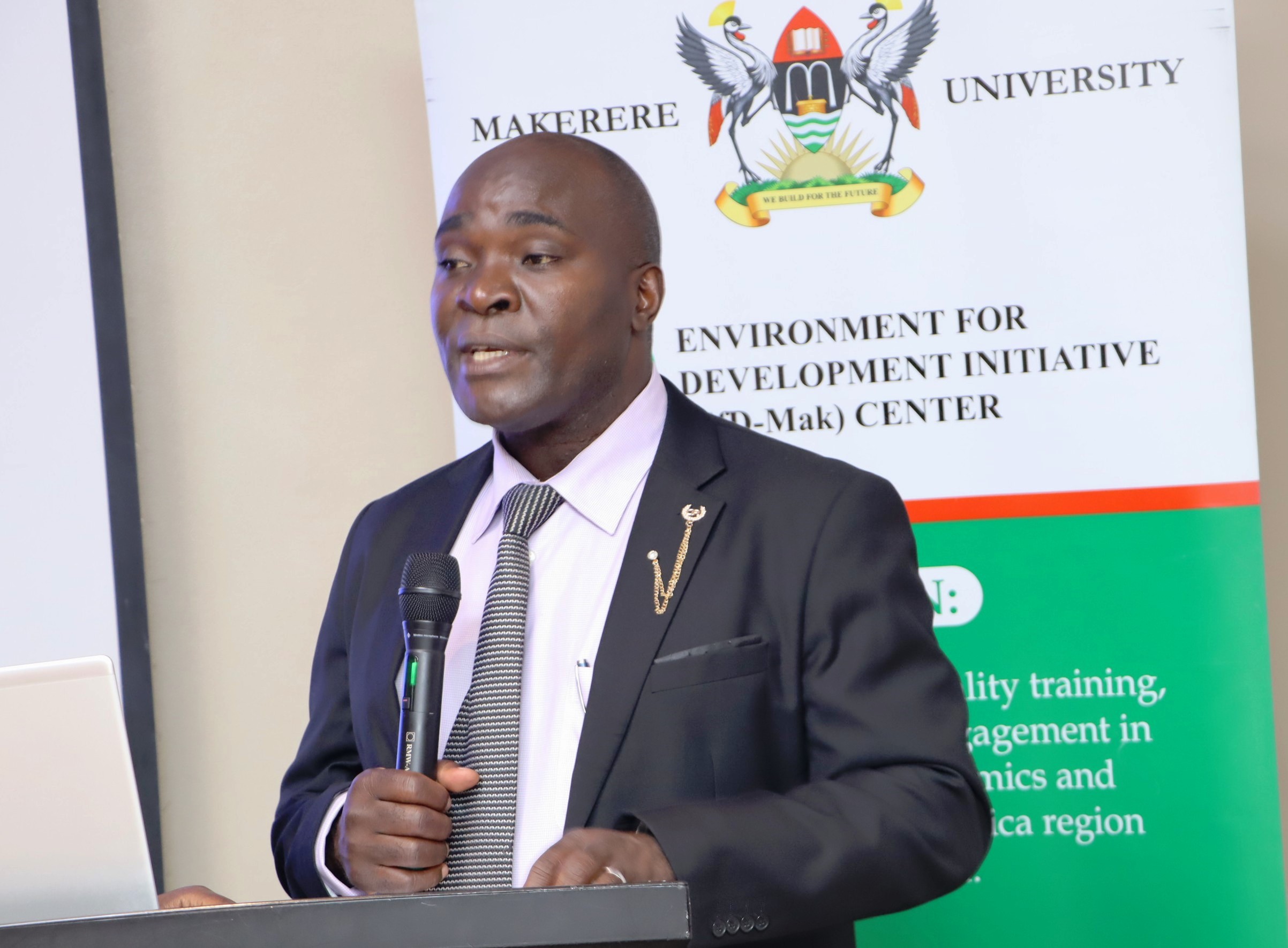
Sseruyange described the workshop’s focus on CSA as “very timely,” noting that climate change has moved from an abstract debate to a lived reality affecting farmers, households and entire ecosystems. “Climate change is no longer something distant. It is happening today, and as a country that depends heavily on agriculture, we must direct our knowledge and skills to climate smart solutions,” he said.
Sseruyange explained that EfD’s annual workshops are purposely designed to reduce the long-standing disconnect between academic research and policy implementation. When researchers work in isolation, he warned, their findings risk remaining unused.
“When you do research without involving stakeholders, your work may remain on the shelves,” he cautioned. “But when policymakers tell you what they want, they own the final product and it informs real decisions.”
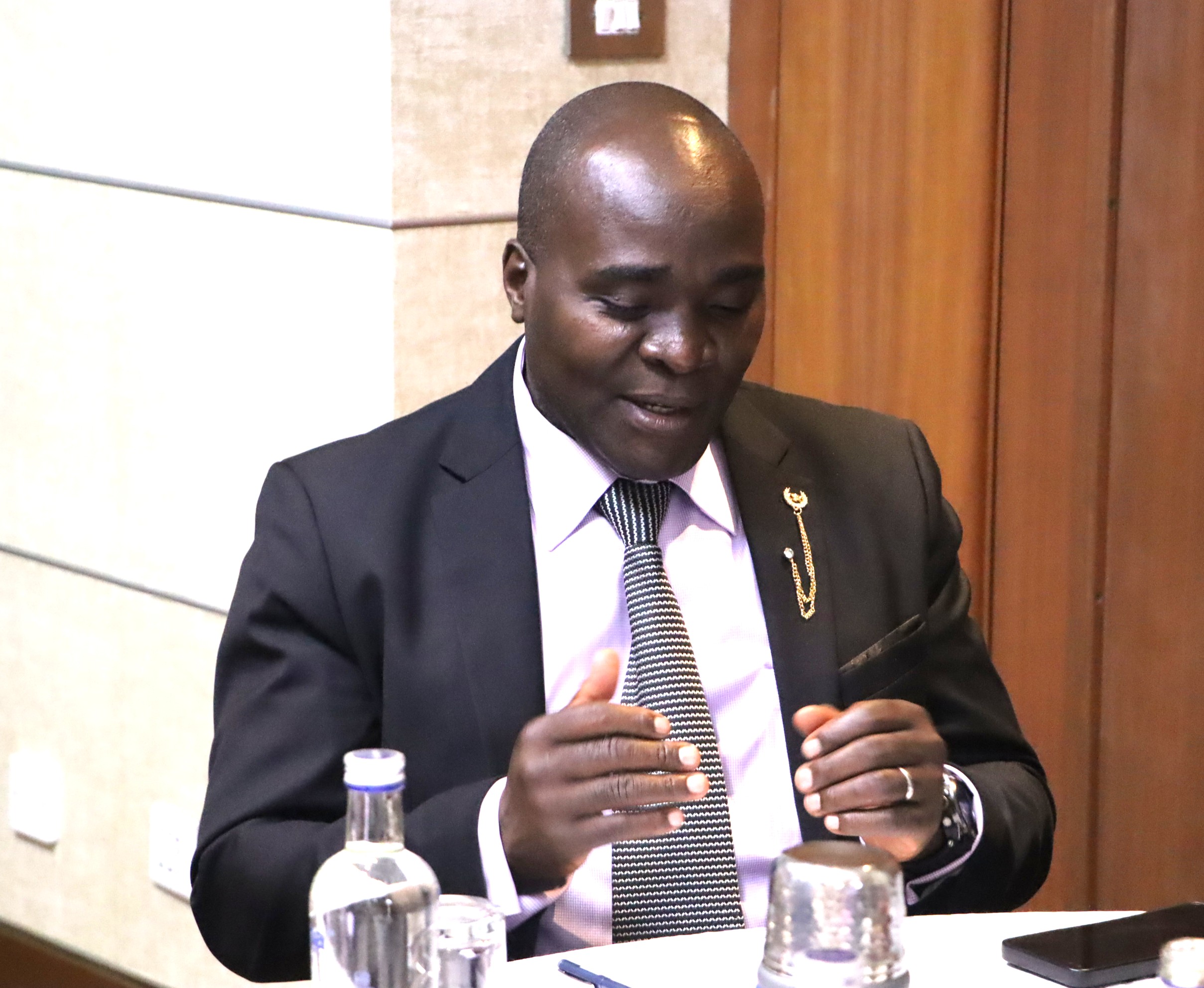
He urged government ministries, district officials, academic institutions and other actors present to actively guide researchers on emerging CSA priorities.
Climate change already deepening Uganda’s vulnerabilities
According to Dr. Sseruyange, climate change is already manifesting through declining agricultural productivity, degraded soil and water resources, and weakened resilience across farming communities. These impacts, he said, continue to slow Uganda’s development and threaten progress in poverty reduction.
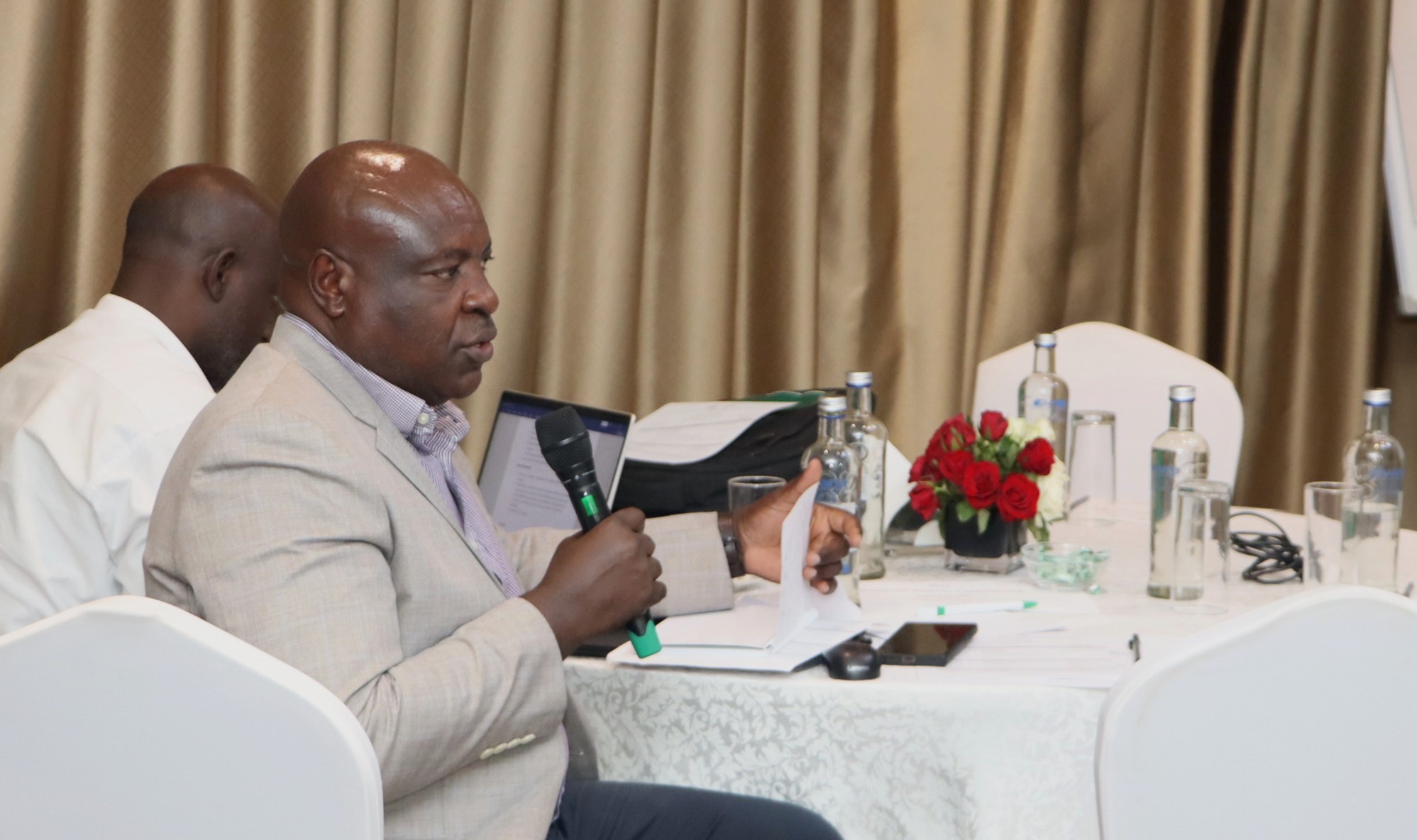
Sseruyange noted that despite agriculture being the backbone of the economy and the largest employer, its performance remains unstable and highly sensitive to weather variability. He warned that shrinking water bodies, degraded wetlands and reduced forest cover are undermining rural livelihoods and stressing agricultural systems.
“Ecosystems are degrading fast. Many of our gazetted wetlands and forest reserves are shrinking, and water sources are getting more strained,” he said. “These challenges directly affect agricultural output and household income.”
Need for targeted research and CSA interventions
Sseruyange emphasized that Uganda cannot advance CSA without research that responds to actual field challenges, especially in the context of increasing droughts, erratic rainfall and soil depletion. He urged researchers to prioritize practical, scalable innovations that strengthen resilience and sustain production.
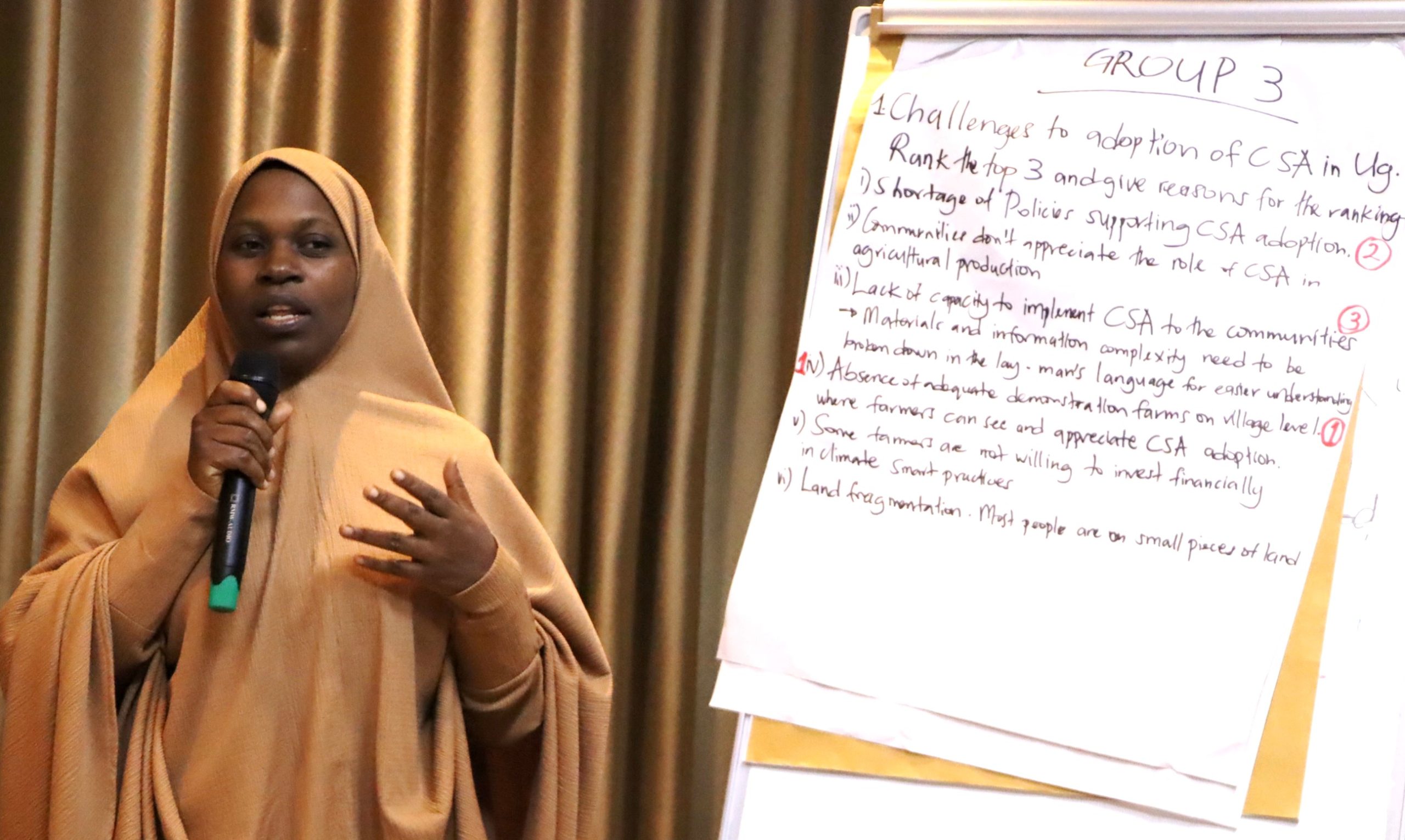
He also highlighted the importance of improving post-harvest handling, mechanization, soil health and climate-resilient farming techniques, saying these areas should guide future research and policy support.
Concluding his remarks, Sseruyange tasked participants with three questions that he said should shape Uganda’s future CSA agenda and guide the work of researchers and policymakers alike:
- Which research areas can help farmers become more resilient and overcome poverty?
- Which CSA approaches are most relevant for boosting farmers’ productivity?
- Which climate-smart strategies can improve post-harvest handling and reduce losses?
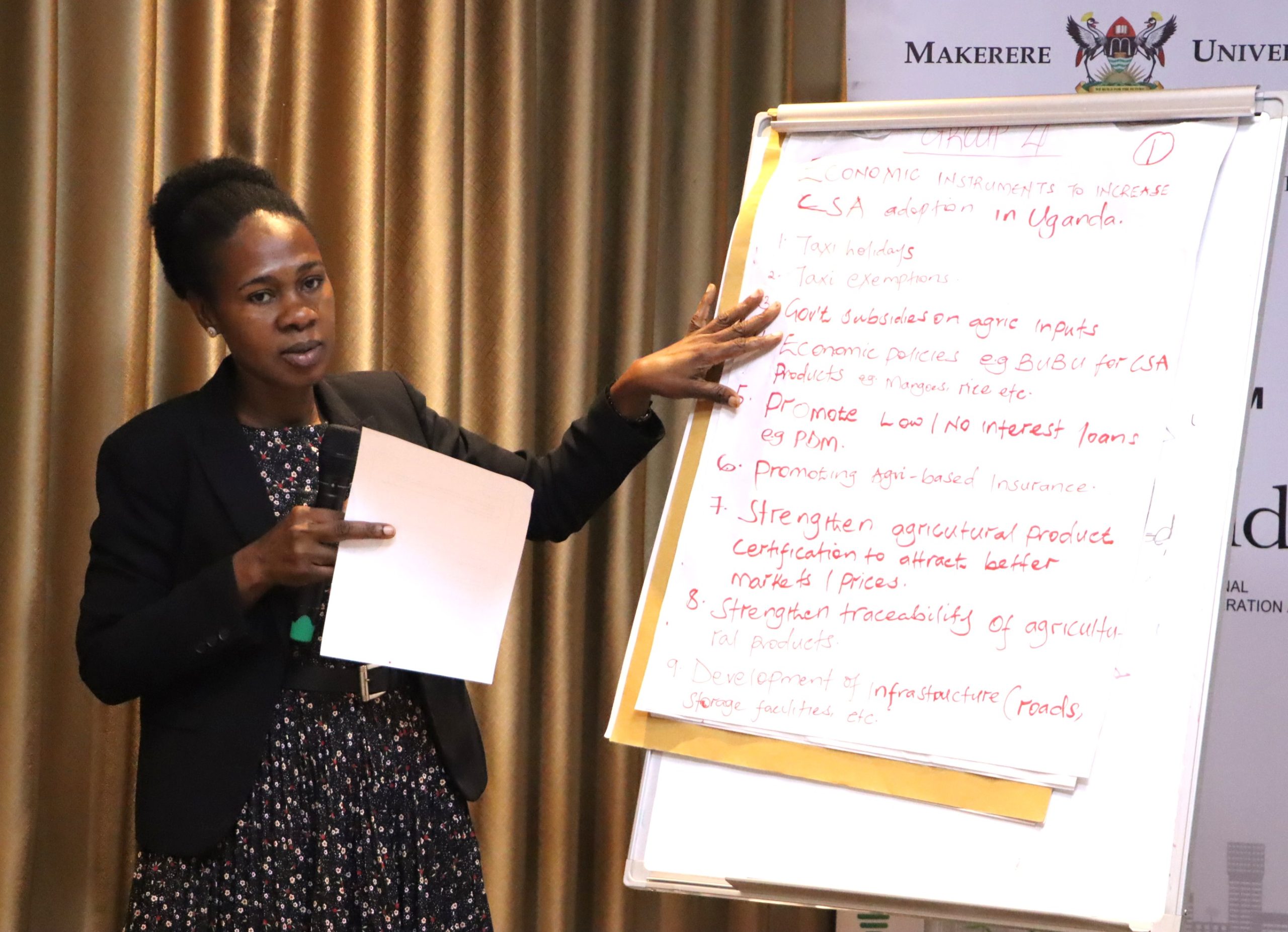
He said these questions will help determine the direction of upcoming EfD research and strengthen the evidence base needed for effective climate-resilient agriculture.
Sseruyange thanked participants for their engagement and reaffirmed EfD’s commitment to supporting Uganda’s transition to sustainable, climate-smart farming systems.
Low CSA uptake threatens Uganda’s food security, livelihoods and long-term growth – Dr. Peter Babyenda
Policy Engagement Specialist Dr. Peter Babyenda sounded the alarm over Uganda’s slow adoption of Climate Smart Agriculture (CSA), warning that the country risks missing its food security and development targets unless farmers, policymakers and extension workers urgently scale up climate-responsive farming practices.
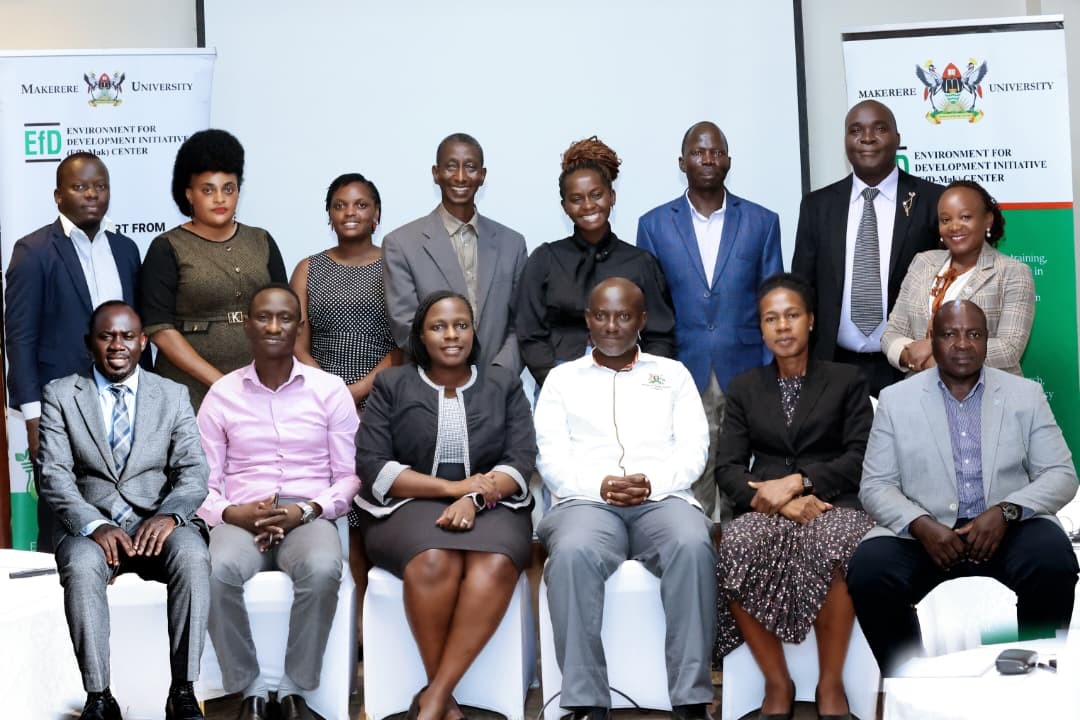
Babyenda said Uganda cannot afford to delay implementing CSA strategies, given the rising threats of drought, floods, erratic rainfall and pest outbreaks that continue to devastate farms across the country.
“CSA offers triple wins – increased productivity, greater climate resilience and potential climate mitigation,” Babyenda said. “But despite these clear benefits, adoption among farmers remains very low.”
Babyenda cited EfD studies and stakeholder interviews showing that farmers face major constraints, including logistical barriers, limited affordability of CSA technologies, inadequate extension services, and low awareness or motivation to adopt climate-resilient practices.
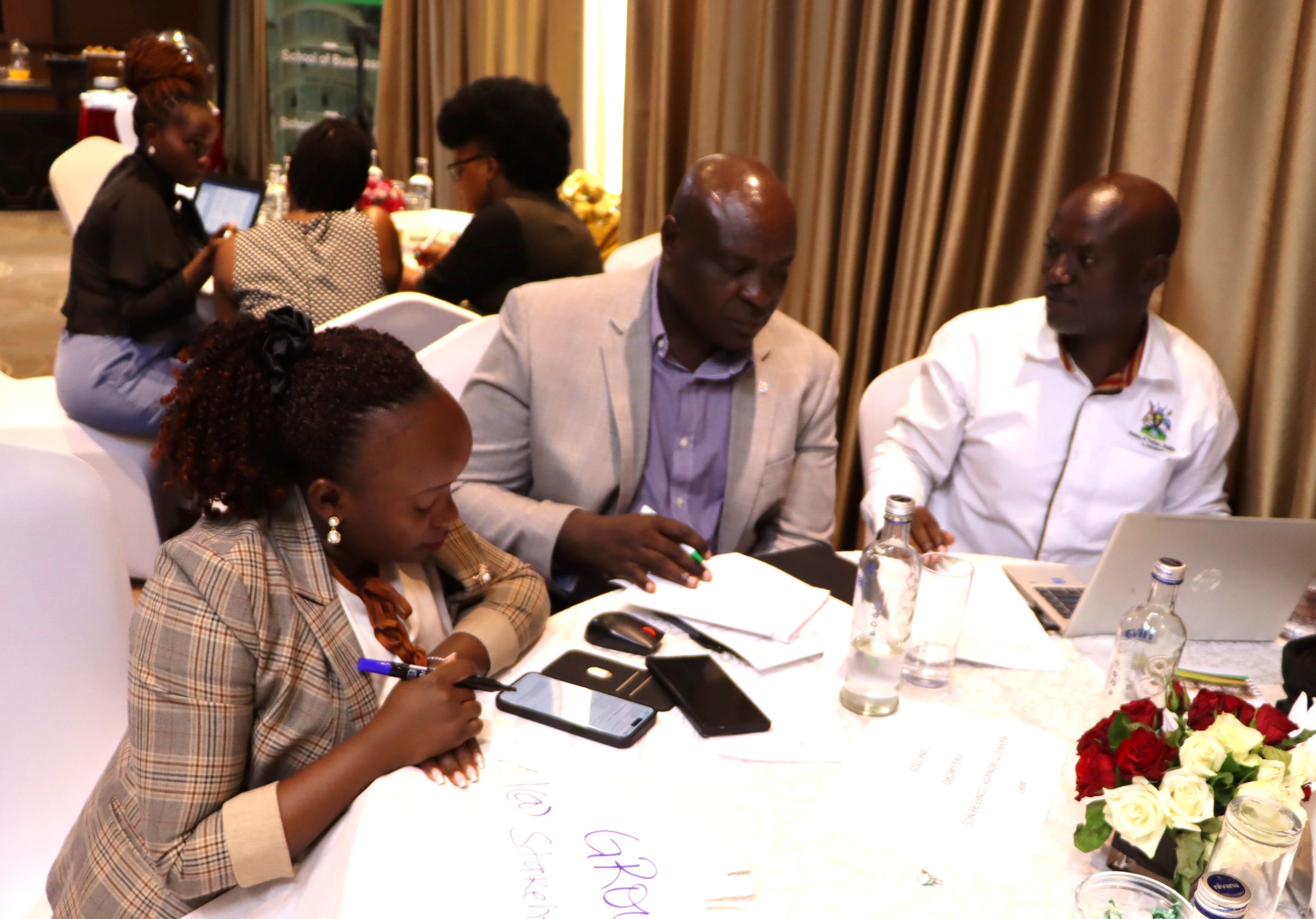
“We need to invest in CSA-focused extension services, support farmer training, raise awareness, and design policies that deliberately include women and youth,” he emphasized.
According to Babyenda, agriculture remains the backbone of Uganda’s economy contributing 23.8% of GDP and employing 68% of the working population. It is also central to the country’s value-addition agenda under the Fourth National Development Plan.
But the sector is undergoing strain from climate change.
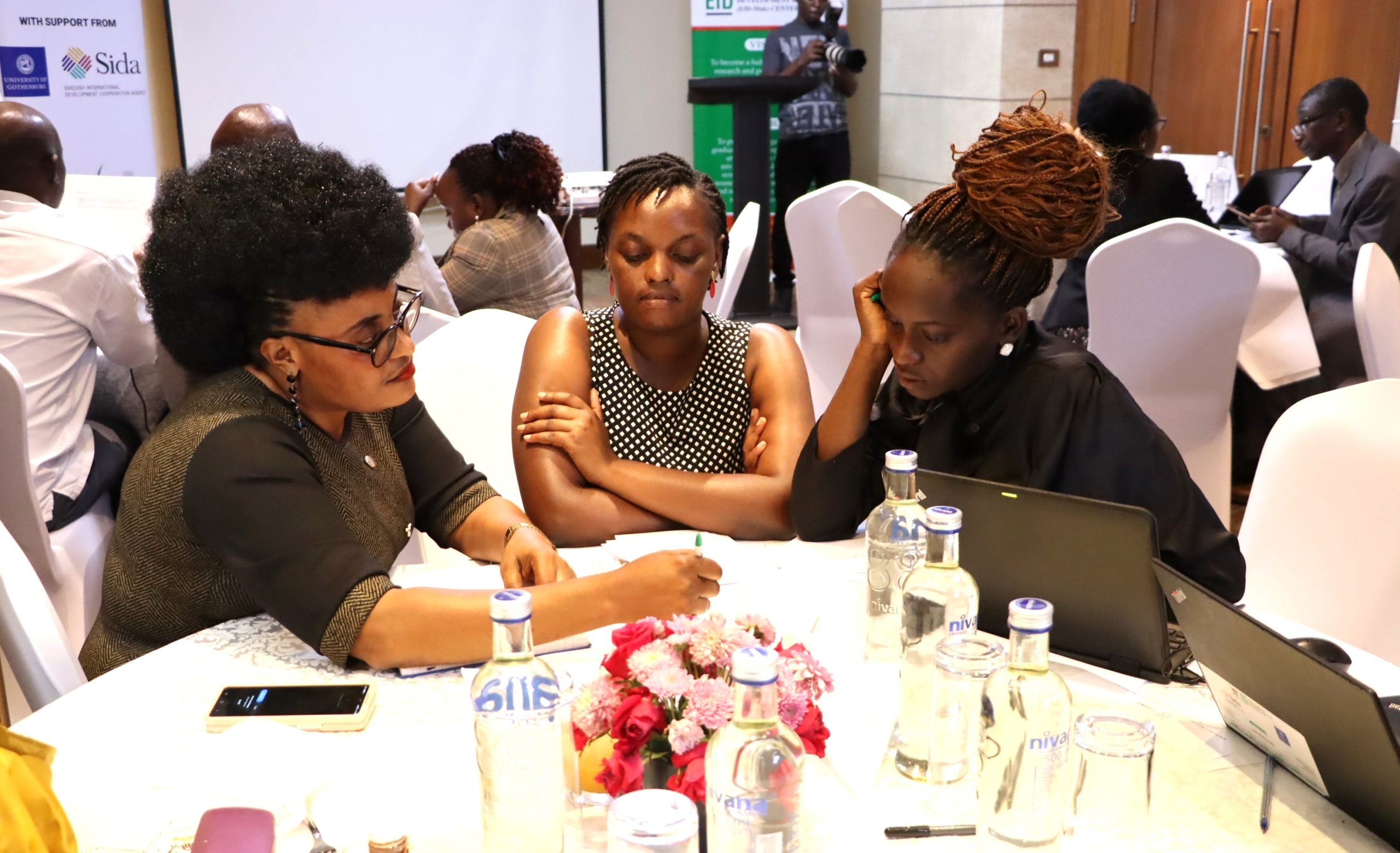
“Over 96 percent of farming households rely on rain-fed agriculture, making farmers extremely vulnerable to climate variability,” he said, citing rising temperatures, shifting rainfall patterns, droughts, floods, landslides and increasing pest and disease outbreaks.
He warned that these climatic pressures threaten food security and Uganda’s long-term economic ambitions, including the country’s “tenfold growth” aspiration by 2040.
Rising population adds pressure
Uganda’s rapidly growing population projected by the UN to potentially double in coming decades has intensified demand for food even as climate impacts reduce agricultural productivity.
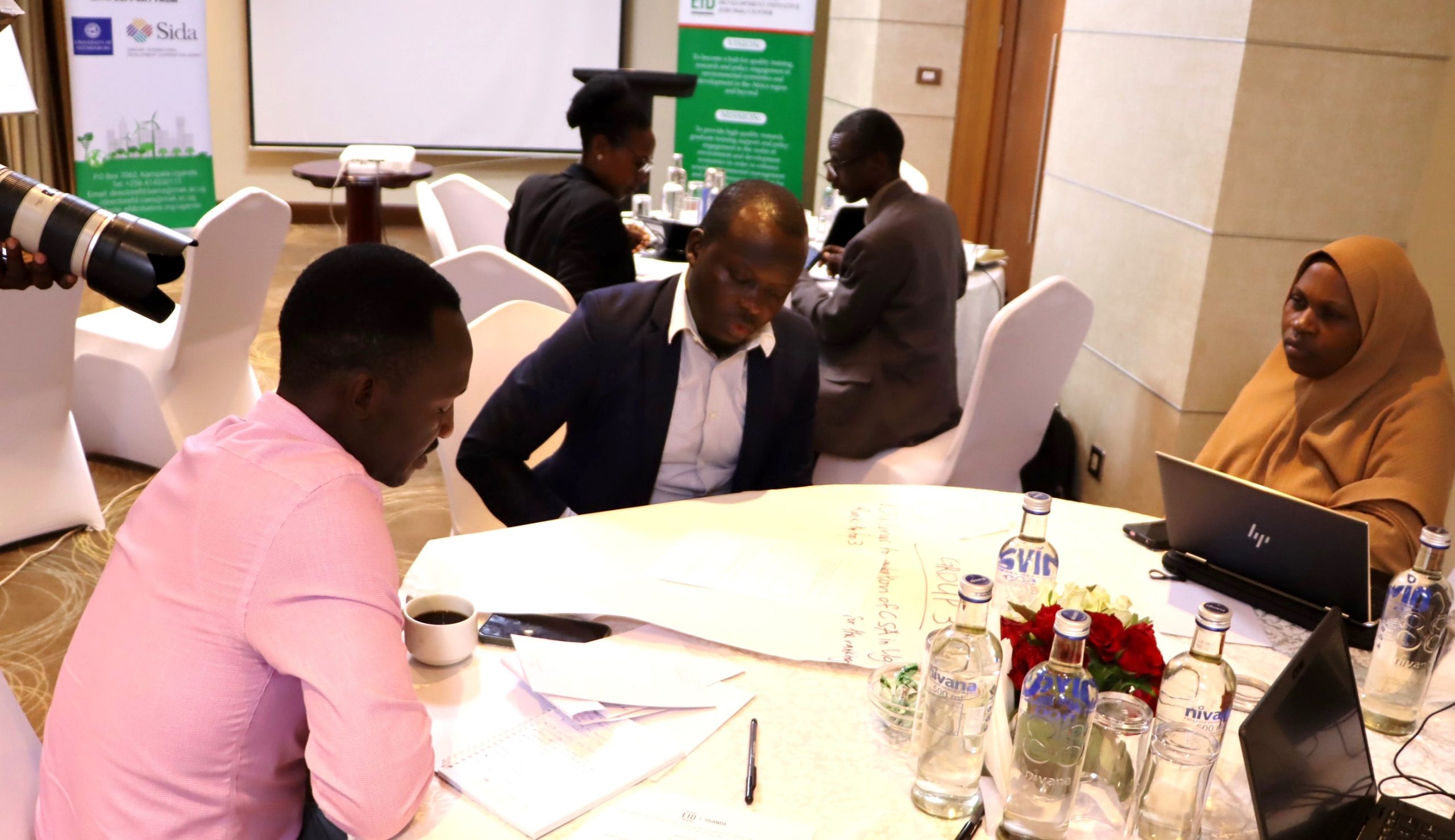
“Farmers face a dual challenge: feeding a growing population while adapting to worsening climate shocks,” Babyenda noted.
He added that agriculture itself contributes to climate change through unsustainable farming practices, creating a “complex cycle” that demands urgent policy and behavioural reforms.
Government moving, but gaps remain
Dr. Babyenda acknowledged that government ministries particularly Agriculture, Water and Environment, Energy, and Finance are already promoting CSA to improve productivity, resilience and emissions reduction.
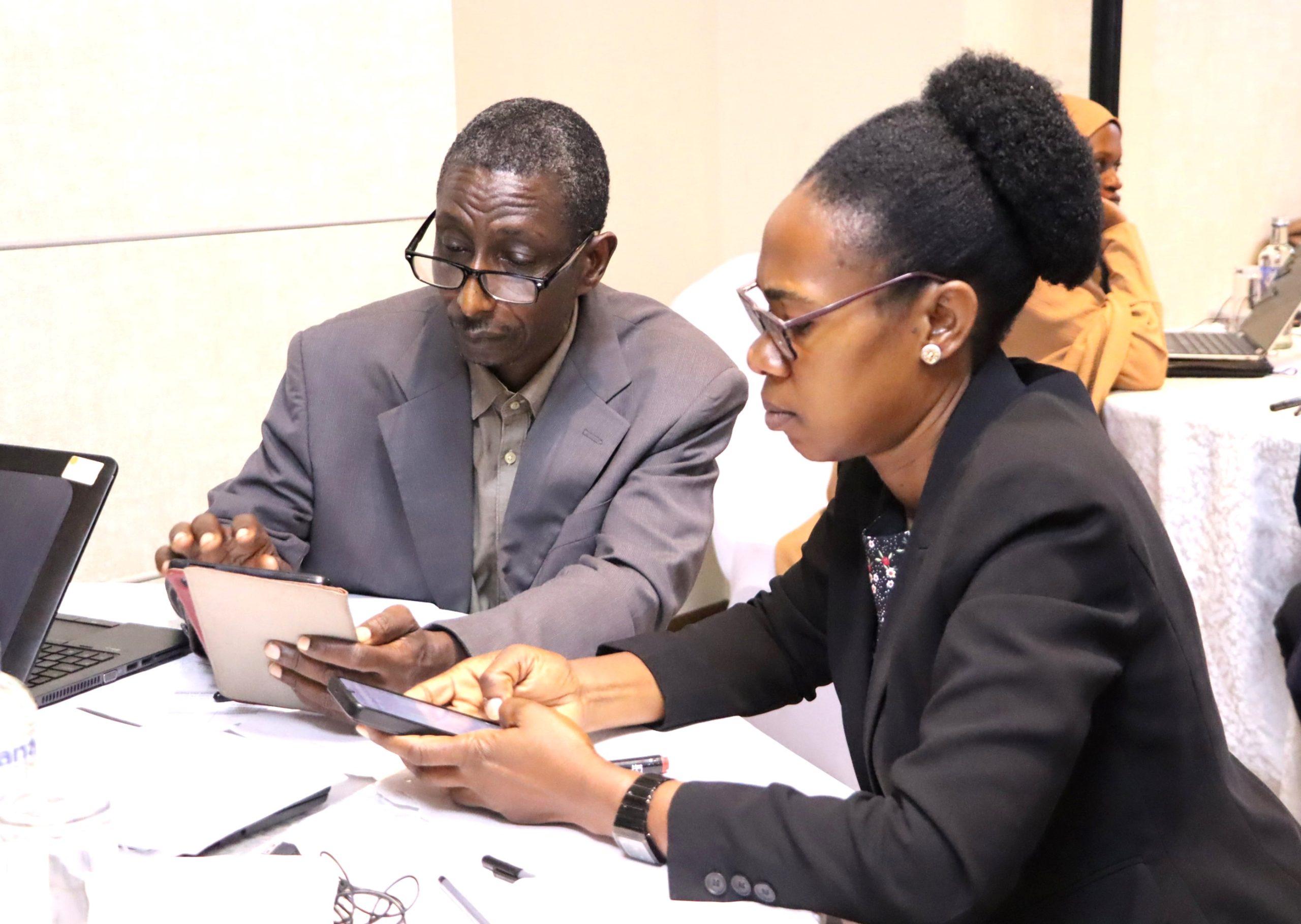
CSA practices such as conservation agriculture, improved seed varieties, water-conserving irrigation, agroforestry and integrated pest management offer Uganda a path to more resilient food systems.
However, he stressed that these interventions must be scaled up and better aligned with local realities.
“We need localized, context-specific partnerships that make CSA accessible and practical for farmers, especially smallholders,” he said.

Dr. Babyenda said the workshop was crucial for ensuring that Uganda’s agriculture sector can withstand climate shocks while supporting economic transformation.
“Scaling up CSA is not just desirable—it is essential for Uganda’s economic and environmental stability,” he concluded.
Transformation Initiative to tackle adoption barriers for smallholder farmers– IGE Fellow
In a bid to enhance agricultural productivity and resilience to climate change, Opeet Thomas, an IGE fellow presented the Transformation Initiative (TI) aimed at accelerating CSA adoption among smallholder farmers in Uganda.
Opeet highlighted that agriculture, which employs over 70% of Uganda’s population, remains highly vulnerable to climate shocks, including erratic rainfall, prolonged dry spells, livestock heat stress, floods, and droughts.
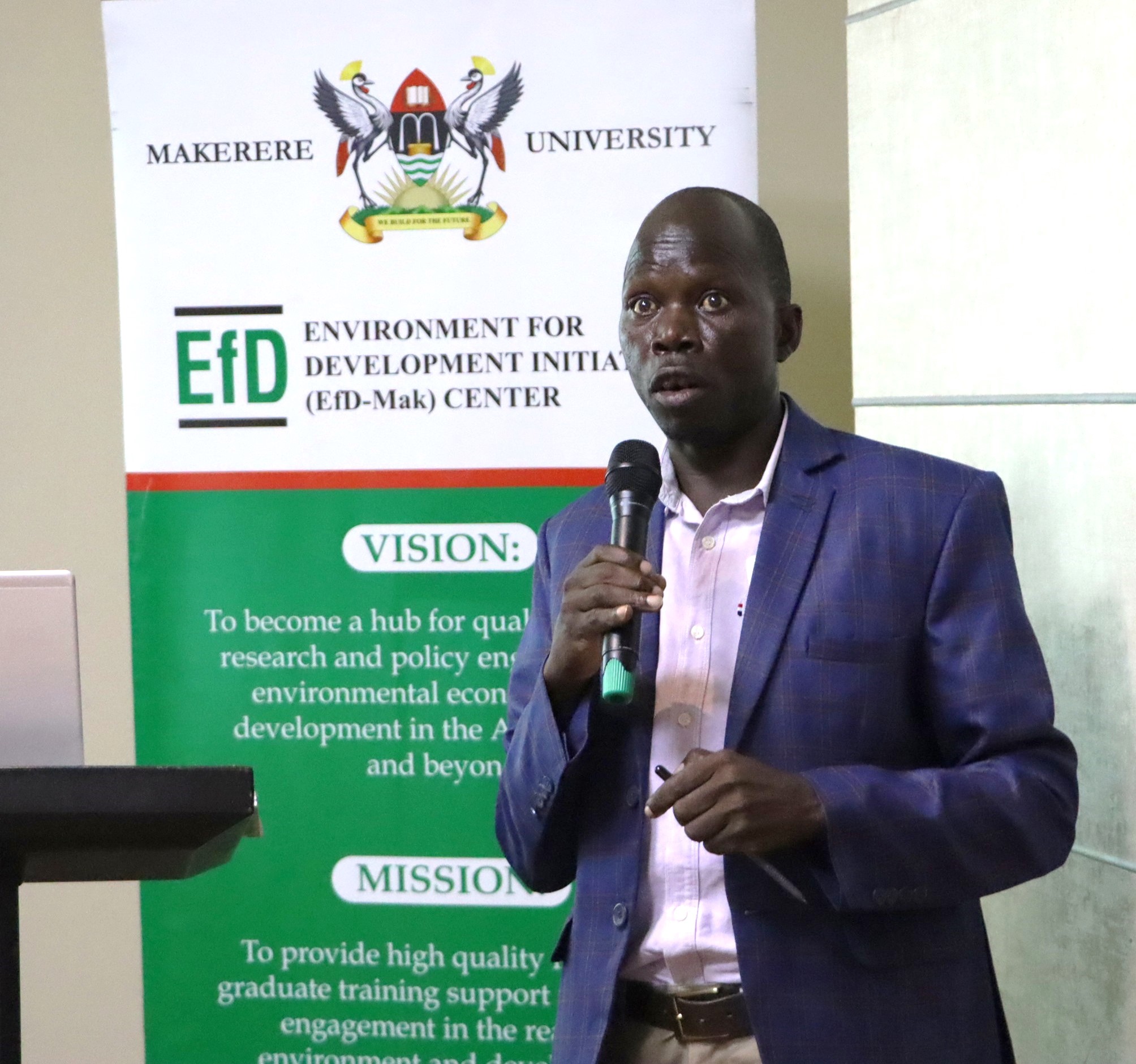
“The challenges are not hypothetical; they are very real for our farmers,” Opeet said, citing a 2019-2020 survey indicating drought as a major contributor to agricultural shocks. “Even this year, planting seasons have been disrupted by unpredictable rains and extreme heat, making it very difficult for farmers to sustain production.”
The Transformation Initiative, a research-based activity developed by IGE fellows, aims to identify solutions to critical issues affecting CSA adoption. Opeet explained that limited uptake of CSA is partly due to low farmer awareness, inadequate extension services, high input costs, and the incapacity of extension workers themselves to disseminate knowledge effectively.
“Extension workers play a pivotal role in bridging the knowledge gap, yet many lack the skills, transport, and institutional support to reach farmers,” he noted, adding that policy and institutional frameworks often fail to prioritize CSA innovations, leaving essential initiatives underfunded or poorly implemented.
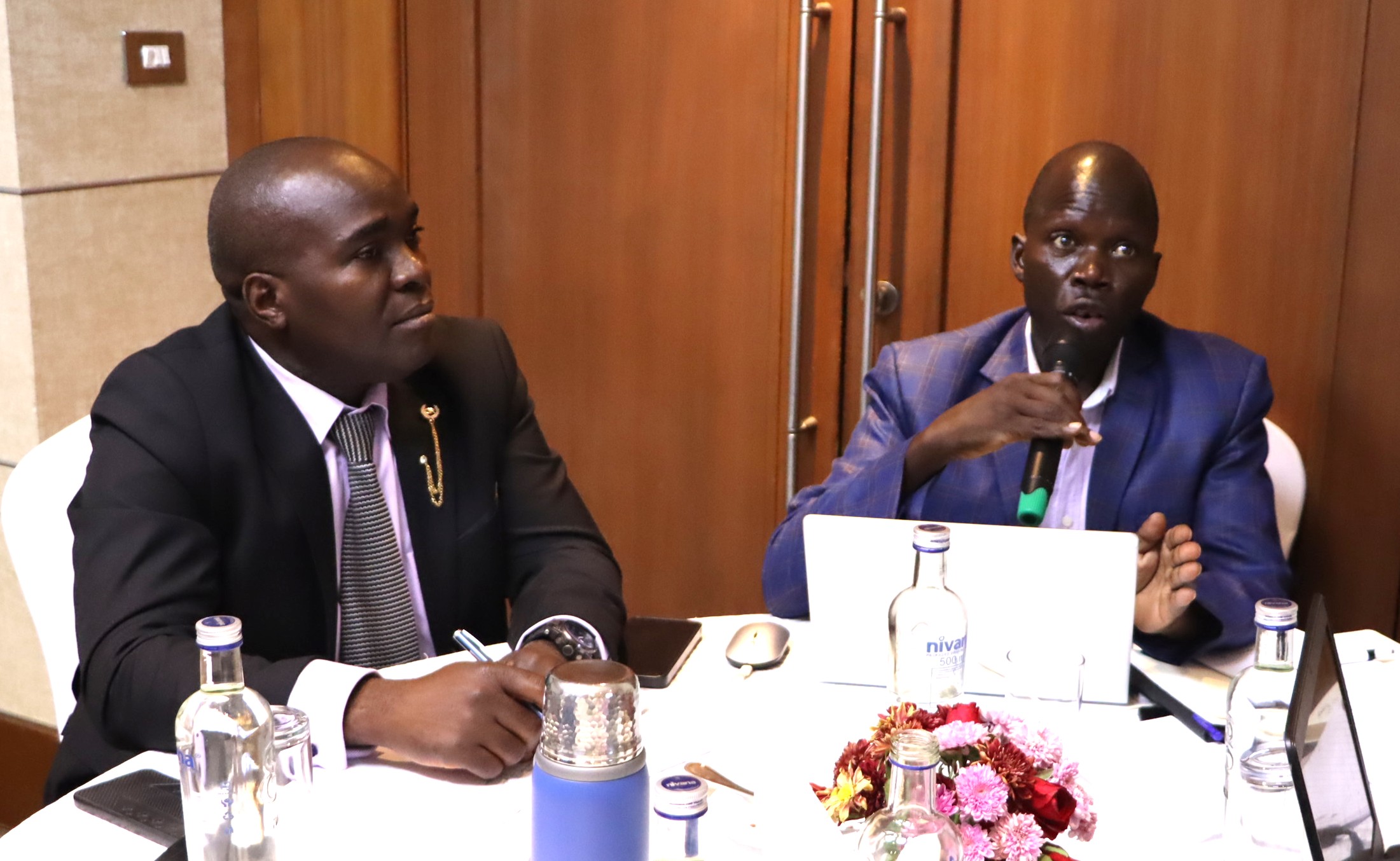
Opeet outlined a framework for technology adoption, emphasizing the interaction between technology providers, supportive policies, extension workers, and farmers. He stressed that even when technologies such as irrigation systems, composting, and the use of beneficial insects like the black soldier fly exist, adoption remains limited due to resource constraints, lack of awareness, and low capacity among implementers.
Highlighting the benefits of CSA, Opeet emphasized the “triple win” it offers: higher production and productivity, increased resilience to climate shocks, and reduced greenhouse gas emissions. He cited examples such as small-scale irrigation and innovative insect-based feed for livestock and fish as practices with high potential, provided they are scaled up effectively.
Despite these opportunities, Opeet warned that challenges persist, including the high cost of inputs, limited water access, land constraints, and a general disinterest in farming among youth. He called for increased research, policy support, and education to bridge these gaps and make CSA accessible to all farmers.
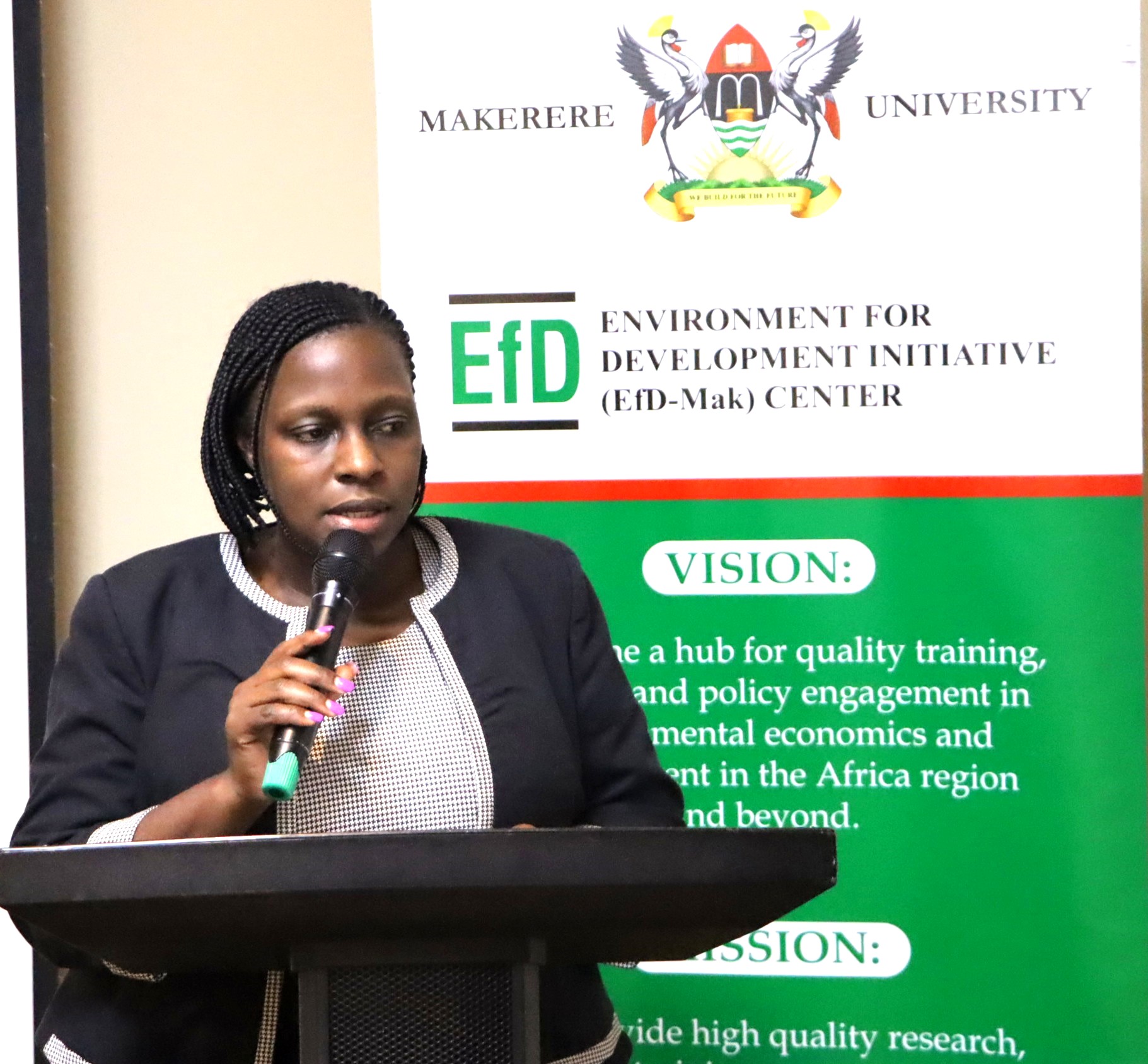
“The goal of the Transformation Initiative is to generate evidence that informs policy and practical interventions so farmers can adopt CSA effectively,” he said. “If implemented, CSA can improve yields, strengthen resilience against climate shocks, and contribute to environmental sustainability.”
Workshop Takeaways: Strengthening Climate-Smart Agriculture (CSA) for National Impact
The workshop brought together key stakeholders to identify practical solutions for scaling CSA across Uganda. Participants emphasized the need for stronger policy engagement, improved extension support, and enhanced cross-sector collaboration to accelerate nationwide adoption of CSA practices.
Experts highlighted the importance of innovation, policy alignment, and farmer engagement as essential drivers of productivity and climate resilience. They noted that meaningful partnerships between researchers and practitioners are critical for translating technical knowledge into actionable interventions on the ground.
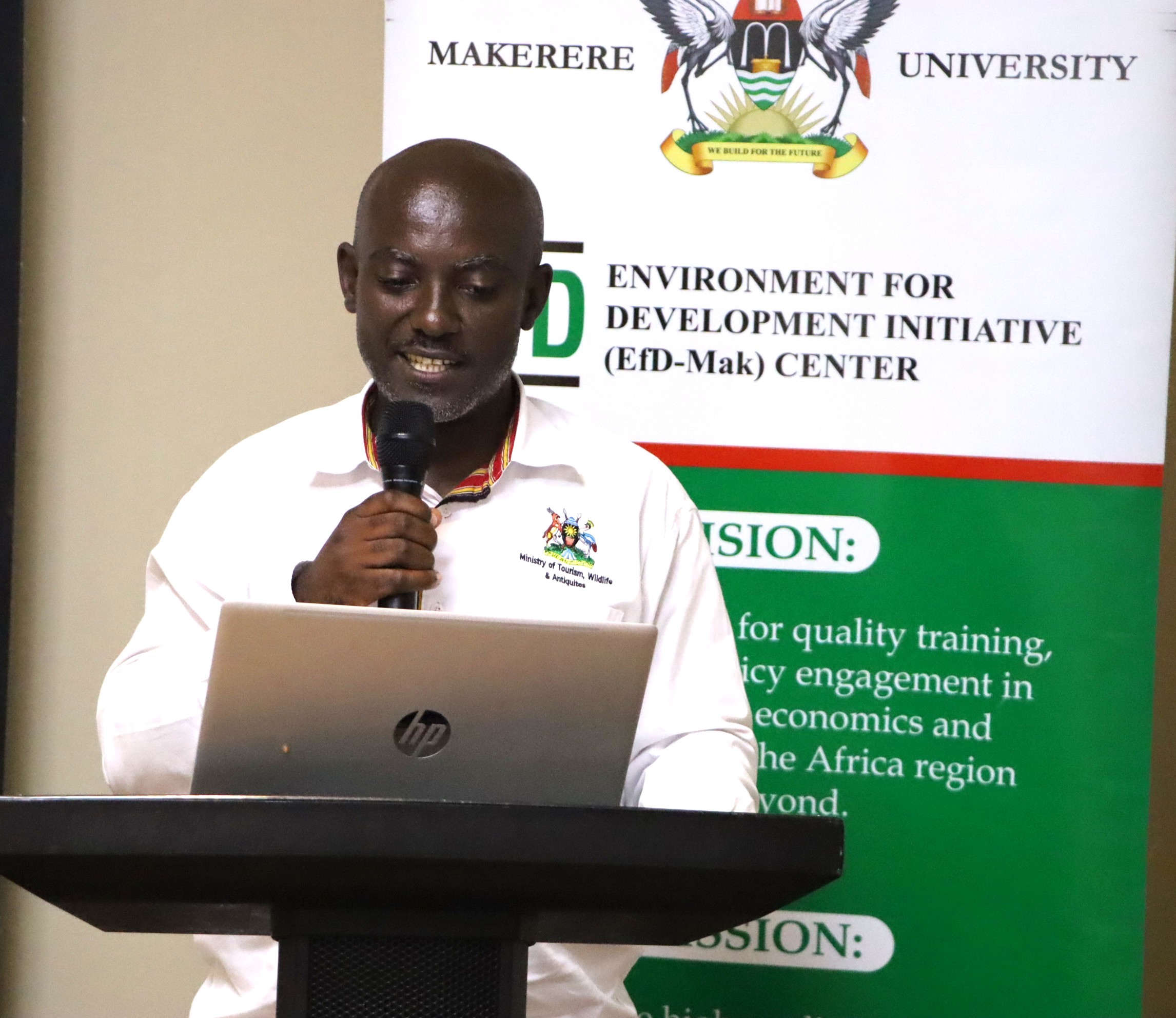
Discussions underscored the urgency of integrating CSA into existing national policies to safeguard food security and strengthen rural livelihoods. Stakeholders also pointed to the value of innovative practices such as irrigation technologies and the use of beneficial insects like the black soldier flies in boosting both productivity and resilience.
Participants identified three priority areas for advancing CSA: Research to enhance farmer resilience and reduce poverty; CSA approaches that sustainably improve agricultural productivity and Strategies to strengthen post-harvest handling and reduce losses.
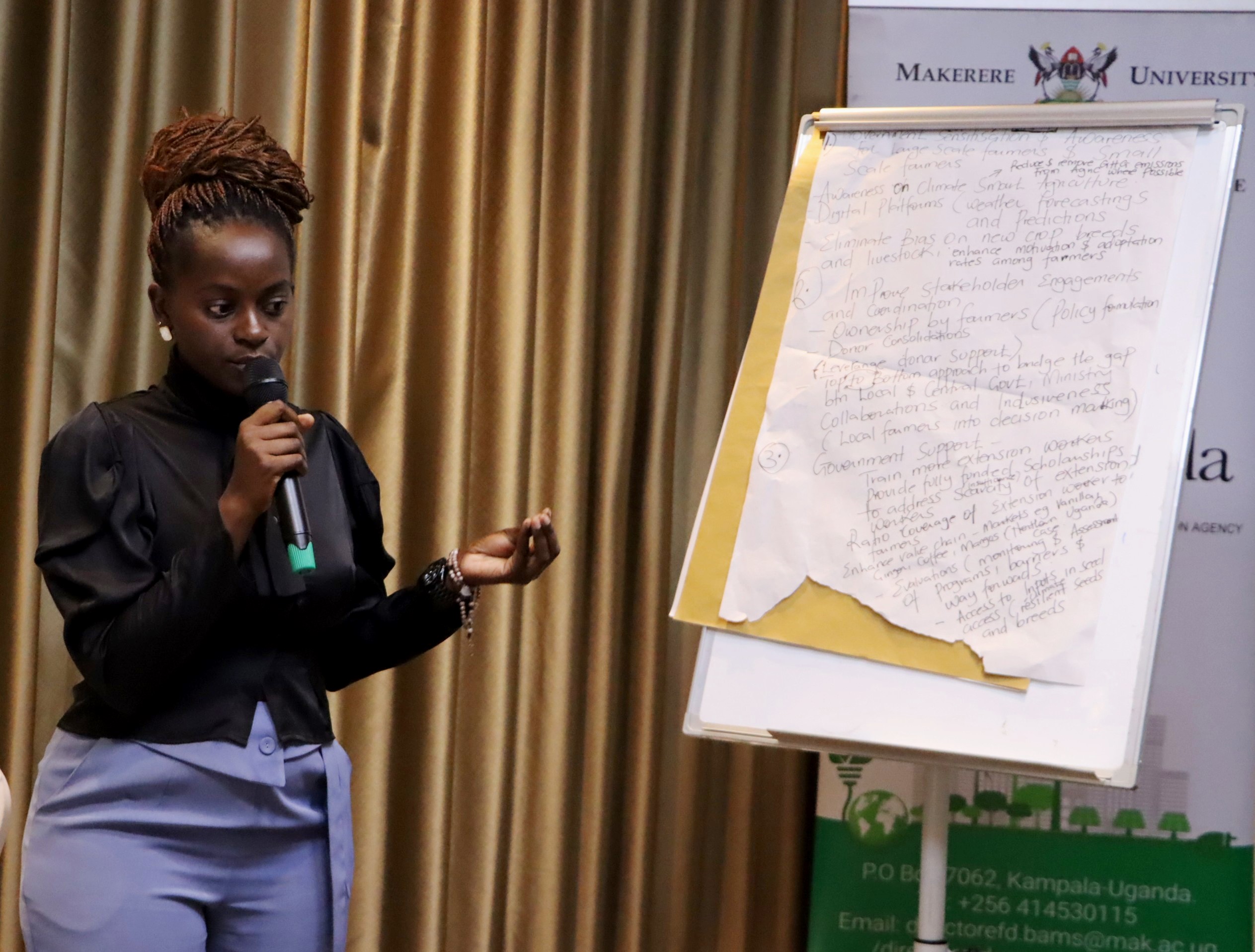
The workshop further highlighted the need to invest in farmer-to-farmer extension models, community-based facilitators, and improved profiling of extension workers to ensure knowledge reaches even remote communities. Participants stressed that CSA solutions must remain affordable and practical, avoiding undue burdens on farmers or the national treasury.
The meeting closed with a strong spirit of collaboration, as stakeholders committed to refining CSA strategies and ensuring that research, policy, and practice continue to move in tandem to transform Uganda’s agricultural sector.
Jane Anyango is the Communication Officer, EfD-Mak Centre

FOREWORD
Guided by its vision and its mission to provide innovative and industry-aligned teaching, learning, and research responsive to dynamic national and global needs, Makerere University is committed to fostering academic excellence while aspiring to be research led, and producing graduates equipped for life, work and citizenship. Thus, the University makes a direct contribution to strengthening the foundation for the country’s human capital and bridging the knowledge and skills gaps, including those with direct relevance to agro-industrialisation, natural resource management, manufacturing, digital transformation, governance, and security.
In line with the overall University strategic objectives, CoBAMS introduced college level research agenda with a modest research grant as a flagship activity in 2024. The college research plan is well aligned to the University wide research agenda especially of creating an enabling and harmonious environment for research and innovation, while cultivating strategic partnerships to enhance our research capabilities.
Our research outputs are also well aligned to the sustainable development agenda 2030 particularly in aspects of ending poverty, education and skills development, good health for all, climate change, ensuring prosperity in growth and business, and promoting peace and partnerships for all. These research outputs are indeed interconnected, recognising that progress in one area affects others, and they strive to balance social, economic, and environmental sustainability, leaving no one behind.
The College remains committed to supporting quality research that contributes to knowledge creation, policy discourse, and societal impact that stimulate policy debate and also foster knowledge and skills acquisition among the researchers.
Professor Edward Bbaale
PRINCIPAL
“Gratitude is due to the lead authors for drafting the manuscripts that embody innovative ideas and new knowledge that informs policy discourse and decision making.”
Business & Management
EfD-Mak, GRO Foundation & BoU Hold High-Level Roundtable on Green and SDG-Linked Financing
Published
7 days agoon
December 3, 2025By
Jane Anyango
Makerere University on Wednesday hosted a high-level policy dialogue bringing together researchers from the Environment for Development (EfD-Mak) Centre, representatives from the Green Gas + Reforestation +Offset (GRO) and Bank of Uganda, to explore alternative financing mechanisms for climate action and sustainable development.
The roundtable, held ahead of the Tumusiime-Mutebile Annual Public Lecture, focused on “Building Capacity and Market Readiness for Green and SDG-Linked Financing Mechanisms through Private Sector Mobilisation Towards Achieving the 10-Fold Economic Transformation (ATMS).”
Discussions highlighted Uganda’s urgent need to expand climate financing, build capacity among financial institutions, and strengthen evidence-based policymaking as climate shocks increasingly affect productivity and inflation.
Partnership With GRO Will Build Capacity for Climate Finance Access – Peter Babyenda
EfD-Mak Policy Engagement Specialist and Research Fellow Peter Babyenda said the centre is implementing an Inclusive Green Economy capacity-building program, with this year’s focus on climate-smart agriculture—an area that requires substantial financing for farmers and enterprises.
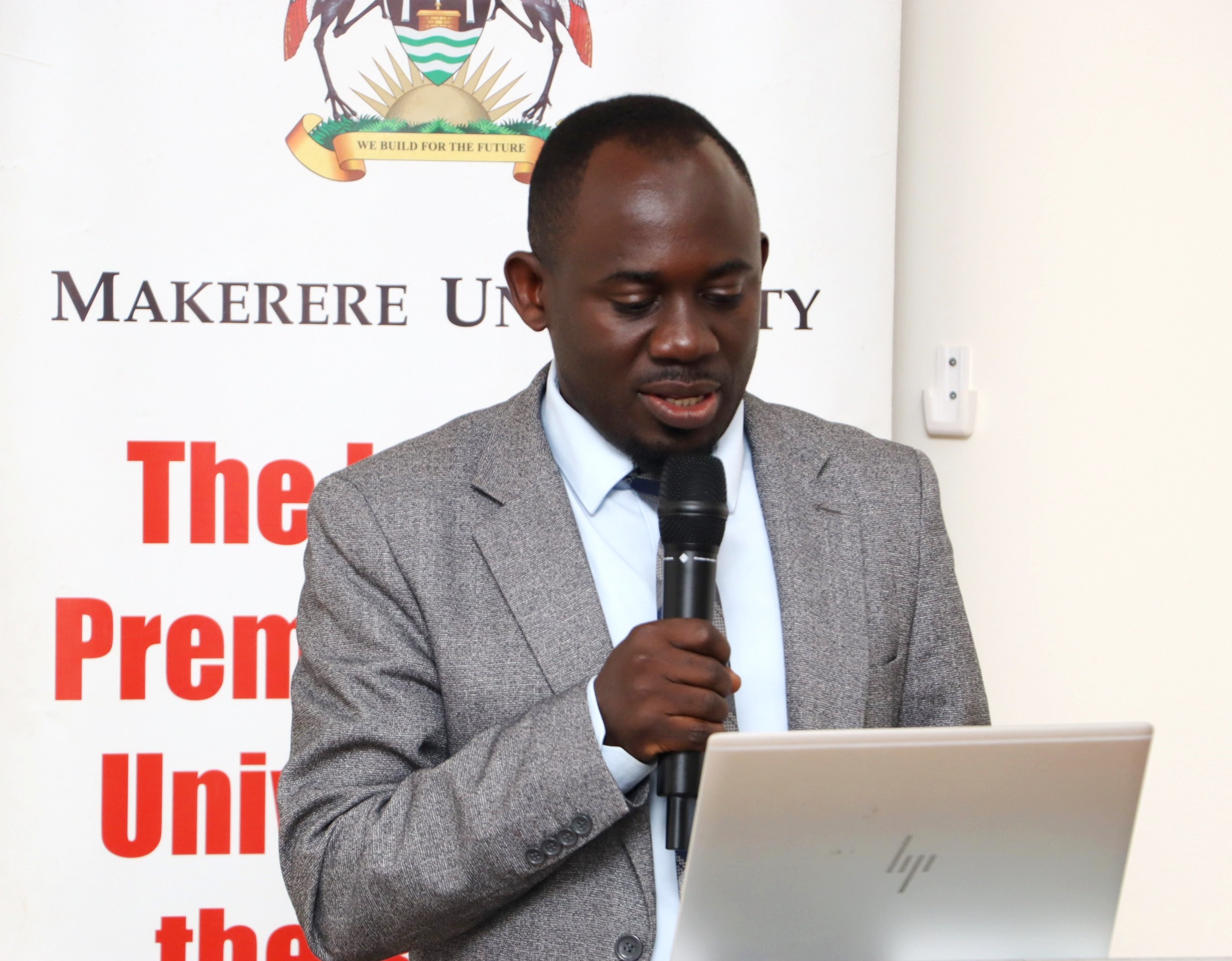
“For you to promote climate-smart agriculture, you need people who can provide finances for farmers to buy the technologies,” he said.
Babyenda explained that EfD-Mak’s collaboration with GRO is aimed at equipping the private sector and financial institutions with the capacity to mobilize and access climate finance, especially for climate-smart investments.
He added that EfD-Mak has recently partnered with the Ministry of Finance to provide evidence for climate action and stands ready to support GRO through stakeholder linkages, technical training and policy research.

“This roundtable is the start of our collaboration with GRO,” he noted, emphasizing that both institutions are aligned in scaling capacity and readiness for climate financing.
Uganda Must Mobilize Private Capital to Meet Climate and Growth Goals– Prof. Bbaale
Delivering the keynote address, Prof. Edward Bbaale, Principal of CoBAMS and Director of EfD-Mak Centre, warned that abnormal weather patterns such as the extreme heat recorded in November underscore Uganda’s growing climate vulnerability.
“When 26th November feels like January or July, then something is not working well with our environment,” Bbaale said.
He stressed that Uganda’s ambition to achieve a ten-fold economic transformation requires a financing ecosystem that supports sustainability, innovation and private sector participation. He noted that Uganda needs US$228 billion to implement its Nationally Determined Contributions (NDCs), yet climate finance access remains constrained.

“The question is not whether we can participate in the global green financing momentum, but how quickly and effectively we can mobilize the private sector and strengthen institutional capacity,” he said.
Bbaale Reaffirms EfD-Mak’s Readiness to Build Capacity and Partner Across Sectors
Prof. Bbaale placed strong emphasis on capacity building as a cornerstone of Uganda’s transition to a green economy. He highlighted EfD-Mak’s ongoing regional program that trains senior civil servants from five East African countries on using fiscal policy to spur green transformation.
“At the EfD-Mak Centre we believe that knowledge, evidence and partnerships are essential ingredients for real transformation,” he said. “We are ready to collaborate with government, with GRO, with international partners to build the capacity needed to advance climate-responsive and SDG-aligned economic planning.”
He underscored that Makerere University has become more open to partnerships and is pursuing a research-led, innovation-driven agenda, adding that such collaboration is central to the university’s strategic plan.

“Makerere is now more collaborative than ever before. As a research-led university, our success depends on partnerships, knowledge-sharing and internationalisation,” he said.
Bbaale Stresses Need for Evidence to Guide Policy, Fiscal and Monetary Decisions
Bbaale highlighted that researchers must generate real-time evidence to support government and financial sector decisions, especially as climate shocks begin to influence macroeconomic indicators such as inflation.
He noted that changing weather patterns have altered harvest cycles, with crops maturing earlier and reducing food availability—factors that directly affect inflation and complicate the Bank of Uganda’s monetary policy operations.
“If the environment is hitting output and therefore inflation, then monetary policy must speak to environmental shocks,” he said.
Bbaale also pointed to the critical need for natural capital accounting, fiscal policy reforms, and institutional strengthening to enable Uganda to unlock climate finance and achieve sustainable economic growth.
Prof. Bbaale urged participants to use the roundtable to diagnose gaps in market readiness, strengthen networks, and advance financial innovations that complement public funding.

“Let us approach today not just as an event, but as part of a broader national commitment to building resilient, green and inclusive economies,” he said.
He encouraged active engagement throughout the session and assured stakeholders that EfD-Mak would continue to support national, regional and global climate initiatives—including the Coalition of Finance Ministers for Climate Action, where Uganda currently serves as co-chair.
GRO Foundation Pledges to Mobilise $1 Billion Annually as Uganda Ramps Up Green and SDG-Linked Financing
Executive Director of the GRO Foundation Laban Joshua Musinguzi, announced that the organisation is committing to mobilising US$1 billion every year for the next five years to support Uganda’s climate finance ambitions, alternative financing mechanisms and the country’s broader goal of economic transformation.
Musinguzi described the session as both a tribute to the legacy of the late Governor Emmanuel Tumusiime-Mutebile and a call to accelerate Uganda’s readiness for innovative and market-based climate finance.
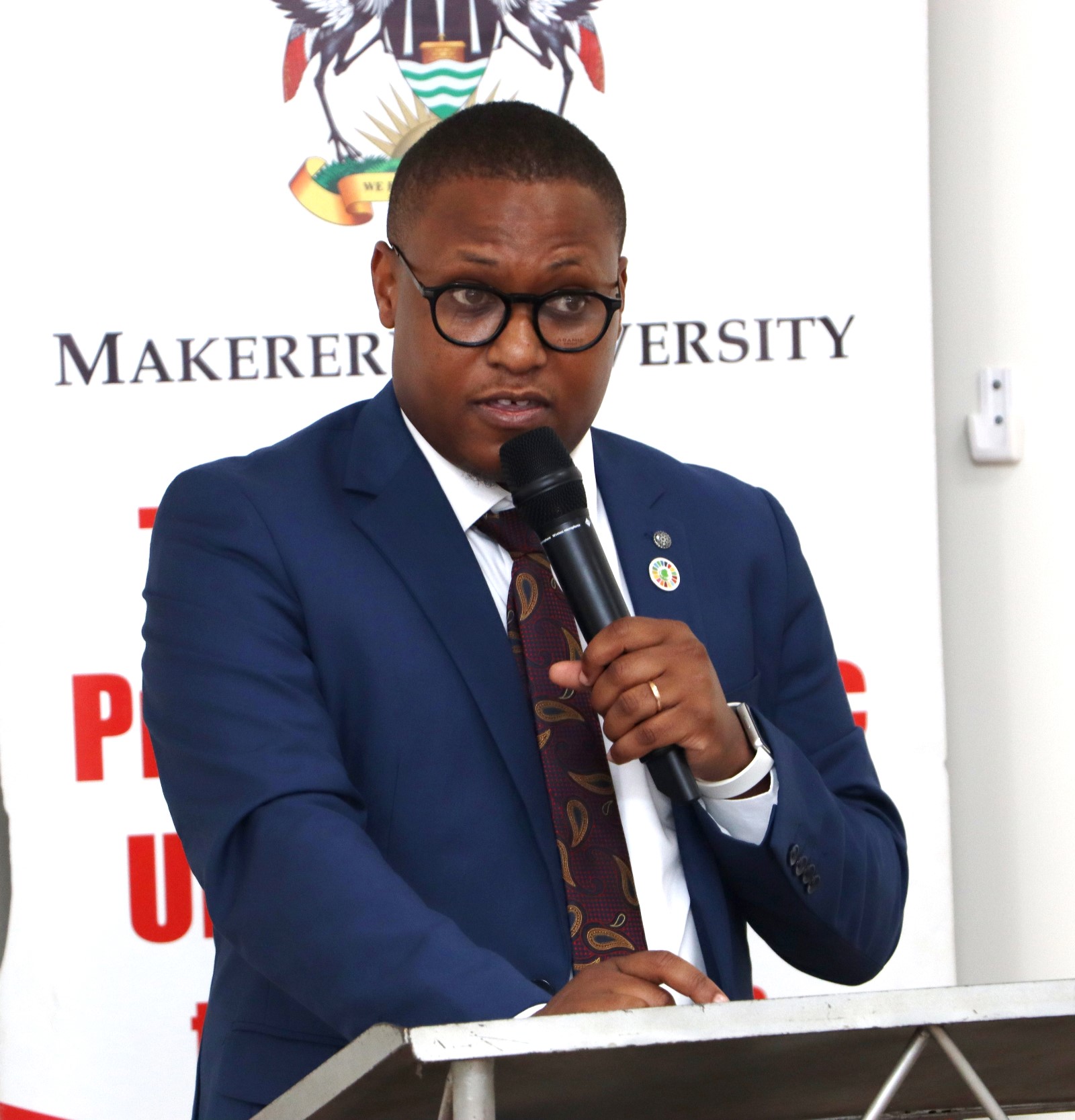
He opened his remarks by honouring the late Mutebile as a pioneer of macroeconomic stability, institutional reforms and private-sector-led growth.
“Today is memorable because we are here to honour a legacy and inspire the future,” he said. “Mutebile’s vision for resilient financial ecosystems still runs in the blood of young economists and statisticians. I am one of them—I studied here, so I am back home.”
He added that Mutebile’s emphasis on private sector participation remains central to Uganda’s ability to mobilise the financing needed for green growth.
Mr. Musinguzi explained that the GRO Foundation—Greenhouse Gas Reforestation Offsets is a social enterprise committed to alleviating poverty by unlocking climate finance through innovative financial instruments.
“We unlock climate finance by creating financial instruments,” he said.
“These include green bonds, carbon certificates, sustainability bonds and commodity-backed bonds.”
He highlighted that GRO is an “interesting space open to disruptive technology,” and reaffirmed the foundation’s willingness to deepen its partnership with Makerere’s EfD-Mak Centre, financial institutions and government agencies.
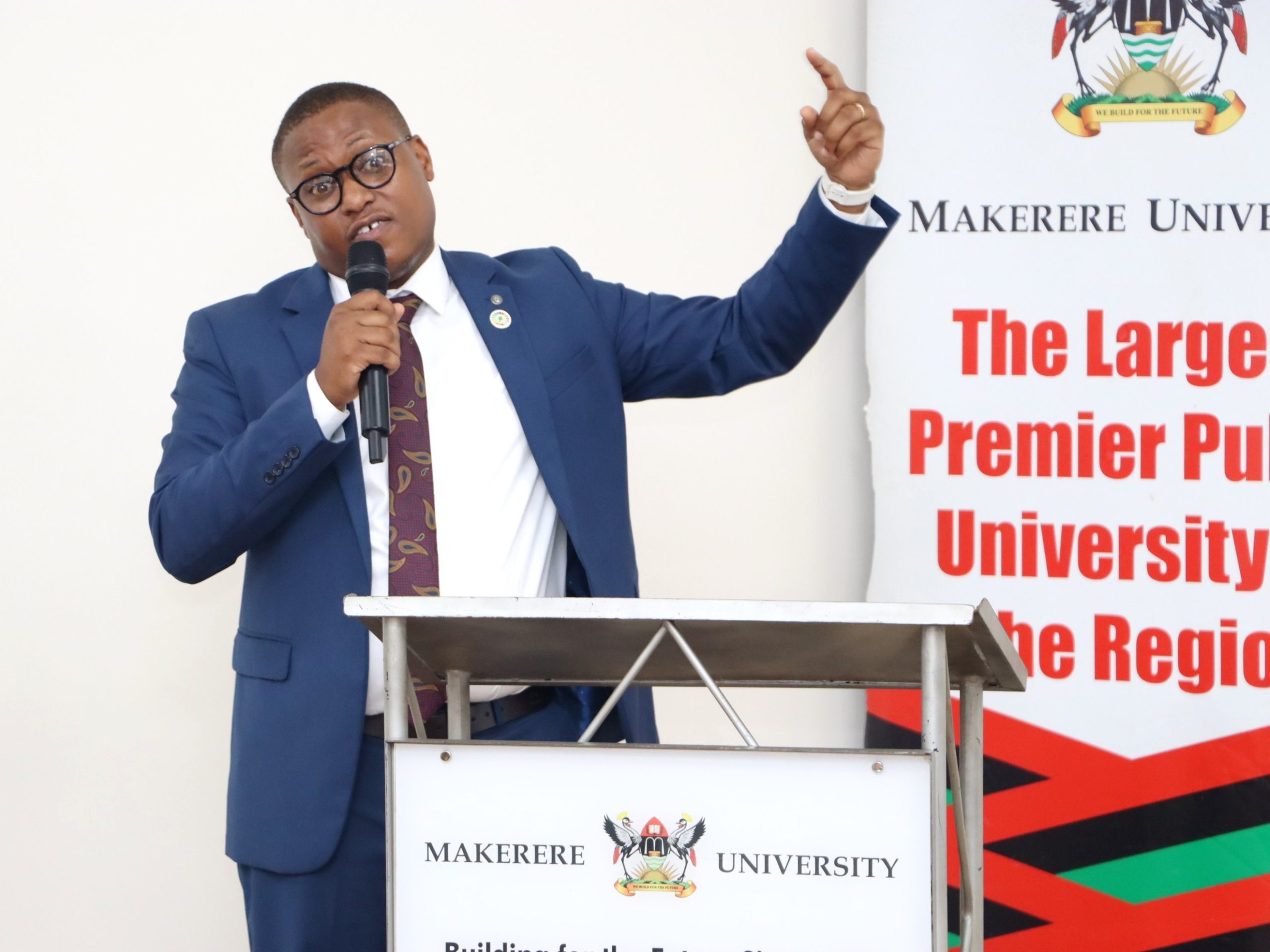
The foundation works under the “Fantastic Four framework”—forestation and deforestation, food security, water security, education and skilling, and green jobs—with the current engagement at Makerere falling under the education and skilling pillar.
Musinguzi said Uganda aims to transform its economy to US$500 billion by 2040, but global shifts are demanding new sources of capital, including green financing, SDG-linked financing and capital markets.
“COP30 reinforced alternative financing as key for developing economies,” he said, adding that Uganda made commitments at the global climate conference to accelerate green bonds and SDG-linked bonds.
Uganda is currently implementing five climate finance strategies—among them the green taxonomy and the climate financing vehicle but Musinguzi stressed that implementation now matters more than awareness.
“We are in the last phase of the SDG agenda. We have no time for awareness—we have time for implementation,” he said.
Gaps in Uganda’s Readiness: ESG Integration Still Below 20%
Musinguzi outlined several gaps affecting Uganda’s readiness to access global climate finance: Only 30–40 financial institutions have internal ESG reporting frameworks; Less than 20% of climate risk guidelines have been integrated into credit products; Commercial banks lack clarity on what qualifies as a “green loan” and that Uganda’s regulatory frameworks have not evolved at the pace of technological disruption
He added that Uganda’s first carbon revenue—about US$40 million took nearly a decade to materialise, underscoring how delays in documentation, data and compliance slow financing.
“We must demonstrate institutional capacity through monitoring, reporting and evaluation systems to unlock financing,” he said.“We must be ready for this money.”
GRO’s Track Record: $1.5 Billion Already Mobilised, New Target of $10 Billion
Musinguzi reported that GRO has already mobilised US$1.5 billion, a commitment made at COP Azerbaijan and later presented during Uganda’s National SDG Conference and the Ministry of Water and Environment’s annual reports.
For 2025–2026, the foundation has set a more ambitious target: “We aim to mobilise US$10 billion next financial year.” He emphasised that when GRO says “mobilise,” it means actualinflow, not mere pledges.

“We mobilise, not promise,” he said. “By the time we call it mobilising, we have already brought the money into the country.”
These funds will support Climate finance business windows, Carbon certification schemes (100 million certificates already registered), Private-public-community partnership models and Clean energy, food security, waste management and youth skilling programmes
Concluding his remarks, Musinguzi urged policymakers, academia, financial institutions and development actors to treat climate finance readiness as a national priority.
“The conversation begins here,” he said. “If not now, then when? And if not us, then who?”
He reaffirmed GRO Foundation’s commitment: “We are ready to mobilise US$1 billion every year for Uganda for the next five years.”
Bank of Uganda Positions Sustainability at Core of Financial Sector Reform
The Bank of Uganda (BoU) has intensified efforts to embed sustainability and Environmental, Social and Governance (ESG) standards across the country’s financial system, describing sustainable development as a “strategic imperative” for Uganda’s long-term economic resilience.
Prisca Ampumuza Rwamare, BoU’s Director of Strategy and Innovation, said Uganda cannot achieve its development goals or meet global commitments without a stable, forward-looking financial sector that is prepared for climate shocks, demographic shifts and resource pressures.
“Sustainable development is no longer optional. It is central to building long-term economic resilience,” Ampumuza said, noting that Mutebile himself consistently emphasised the impact of financial institutions on society.
She revealed that the Bank has redefined its purpose and mission under the 2022–2027 strategic plan to reflect its commitment to socioeconomic transformation. “We had to rethink our business model and strategy,” she said. BoU has integrated sustainability into monetary policy operations, financial stability oversight, payment systems modernisation and risk management frameworks.
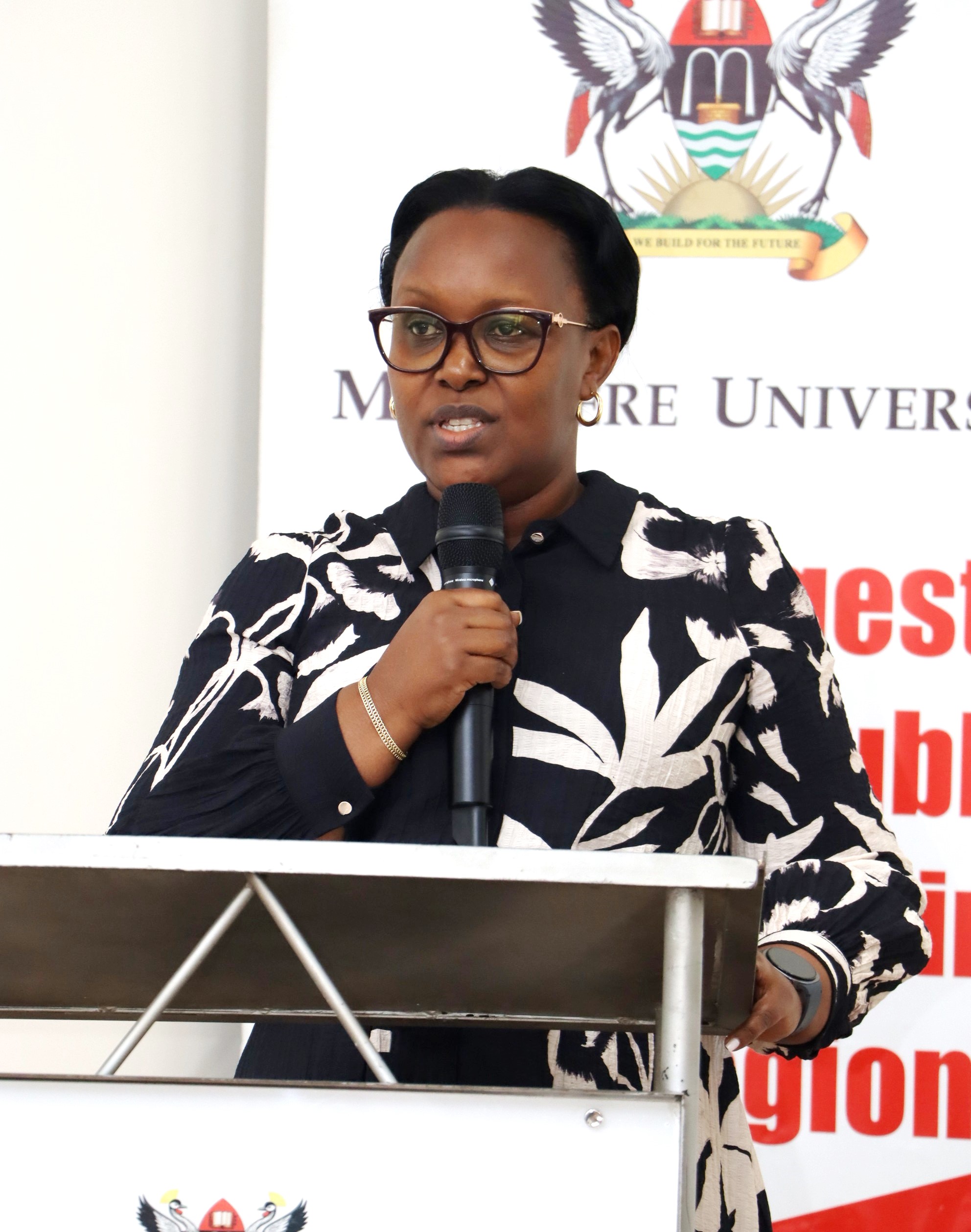
The central bank has also signed up for the Sustainability Standards Certification Initiative and revised its corporate social responsibility policy to align with ESG priorities.
Ampumuza highlighted several regulatory steps already underway. In partnership with the Uganda Bankers Association, BoU co-developed an ESG framework for the banking sector, launched in June 2024, with commercial banks now reporting quarterly on progress. BoU has also issued guidelines for managing climate-related financial risks and is reviewing its micro- and macro-prudential supervisory tools to enforce ESG compliance.
A key concern, she said, is preventing “greenwashing” in the financial sector. “We take this very seriously,” she noted, warning against superficial sustainability claims that do not reflect real environmental or social impact.
Innovation, Culture Shift and Collaboration Critical
According to Ampumuza, sustainable finance cannot be achieved through policy updates or digital systems alone. She stressed the need for institutional culture change, data-driven supervision and innovative solutions. That week she said the Bank launched an ambitious Innovation Strategy to support this transformation.
She noted that BoU is undergoing a culture change programme to empower its young workforce over 100 newly recruited staff to champion SDGs and sustainable finance within a traditionally cautious institution.
BoU is also collaborating with international partners including the World Bank, IMF, IFC and the global Network for Greening the Financial System (NGFS) to strengthen policy frameworks and build capacity.
Despite progress, Ampumuza said banks continue to struggle with implementing sustainable finance principles due to capacity gaps, absence of baseline ESG data and limited availability of bankable green projects. She revealed that BoU, the Uganda Bankers Association and the Institute of Bankers recently completed a curriculum on sustainable finance to support sector-wide training.
Ampumuza concluded that sustainability is now fully integrated into BoU’s internal operations. A dedicated department and ESG coordination division have been established, and all projects across currency management, logistics and infrastructure must demonstrate compliance with environmental and social standards. “If this is replicated across the banking sector, we will make significant impact,” she said.
Participants Chart Path to Green and SDG-Linked Financing
A panel, moderated by Canary Mugume, comprising Dr. Peter Babyenda, a climate finance economist from Makerere University, Ms. Elizabeth Mwerinde, Head of Commercial Banking at Ecobank, and Dr. John Sseruyange, an environmental economist at Makerere University examined Uganda’s readiness for green and SDG-linked financing, with a special focus on institutional perspectives and market preparedness.
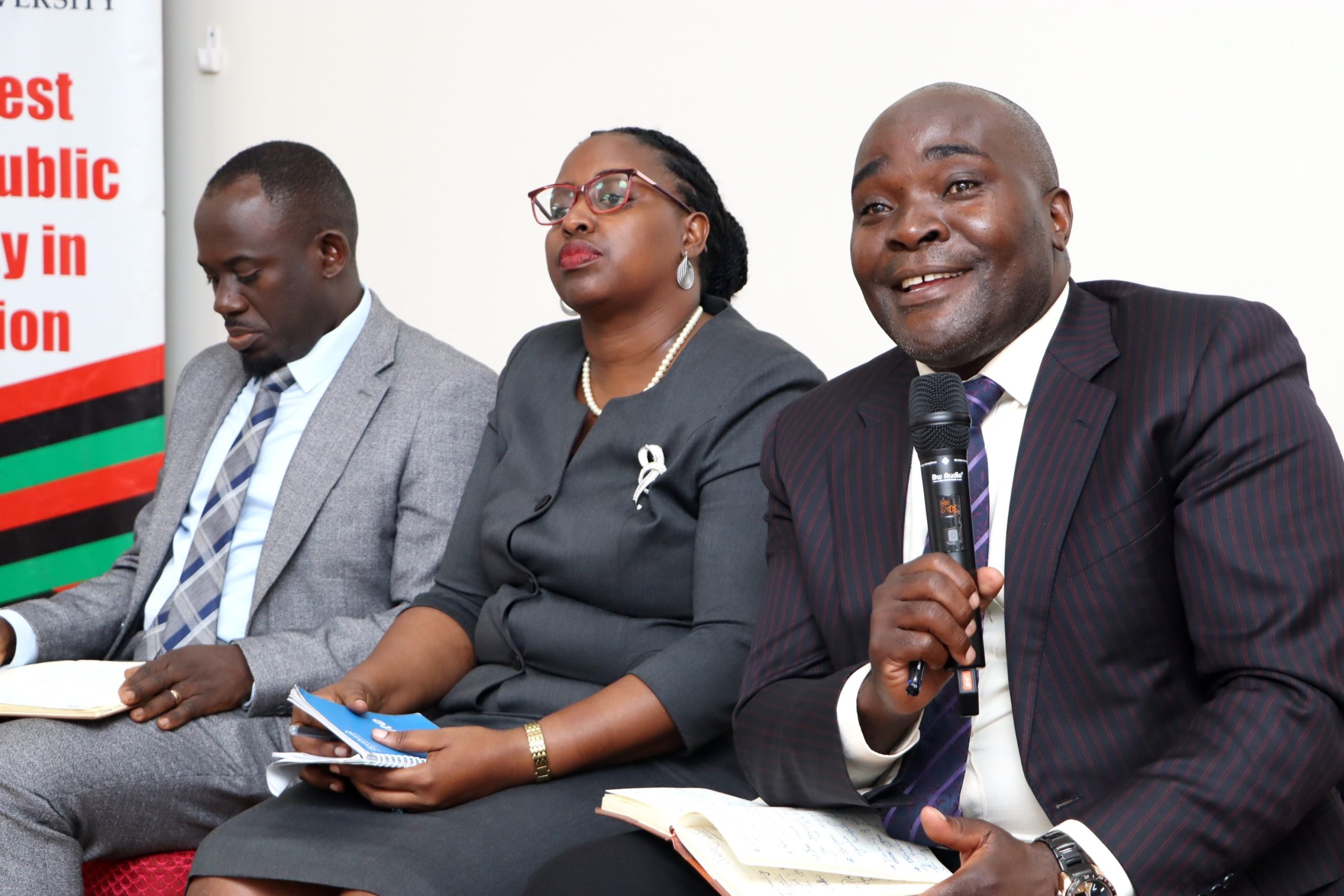
The discussion underscored that sustainable development is no longer optional for Uganda—it is a strategic imperative for economic transformation. Global financial shifts are creating new opportunities through green finance networks, SDG-linked instruments, and carbon markets. Yet, while Uganda’s macroeconomic fundamentals are strong, the greening component of its economy remains weak.
Speakers emphasized the strategic role of diverse actors in mobilizing green finance. Academia, the private sector, financial institutions, and government all share responsibility, but partnerships must also reach beyond traditional stakeholders to include religious and cultural leaders who can influence public awareness and mindsets. The private sector, in particular, was identified as the engine for Uganda’s ambitious economic transformation.

Despite the potential, persistent challenges remain. Low institutional awareness, limited readiness among financial institutions, and the absence of a strong pipeline of bankable green projects hinder progress. Critical data gaps were highlighted, with Uganda possessing “data sets, not databases,” and research outputs were said to insufficiently inform policy and decision-making.
Panelists stressed the need for evidence-based approaches: different sectors require tailored policy instruments, and academia and think tanks have a vital role in guiding government policies, investment design, and risk assessment. Institutions must deepen their understanding of green financing mechanisms, climate risks, and ESG compliance, while reporting standards and transparency must be strengthened across all levels of the financial system.
Innovations and ongoing initiatives offer a glimpse of progress. The launch of a Sustainable Finance Curriculum for financial institutions and platforms like the monthly “Carbon Tuesdays” at Kati Kati are building capacity and creating space for innovative ideas on carbon markets and climate finance. Meanwhile, the government’s deliberate role in shaping regulatory frameworks and deploying policy instruments—including incentives, guarantees, blended finance, and public-private partnerships—was highlighted as essential.
Mobilizing private capital was presented not as a replacement for public finance, but as a critical complement, expanding Uganda’s financing capacity. The country’s credibility, transparency, and demonstrated ability to manage large-scale investments are key to attracting private investors, alongside a clear pipeline of viable instruments.

The roundtable concluded with a call for a renewed strategy: Uganda must return to the drawing board, scale up bankable green projects, and strengthen institutional capacity. Success, panelists agreed, will depend on partnerships, credible data, strong governance, and unified commitment across sectors—a holistic approach to greening Uganda’s economy and advancing sustainable development.
Jane Anyango is the Communication Officer, EfD-Mak Centre
Trending
-
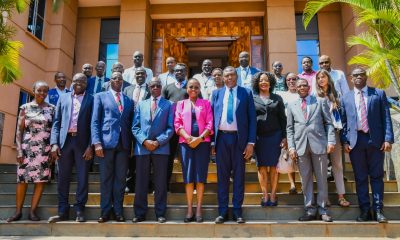
 Health2 weeks ago
Health2 weeks agoIDI launches the Sewankambo Training Program for Global Health Security in Africa
-
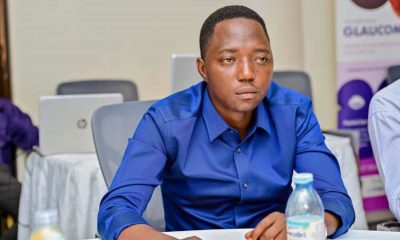
 General1 week ago
General1 week agoFrom Mastercard Foundation Scholar to Changemaker: Dr. Ekwaro Ronald’s Vision for Eye Health in Uganda
-

 General5 days ago
General5 days agoCall For Expression of Interest: WEE-DiFine Research Initiative
-
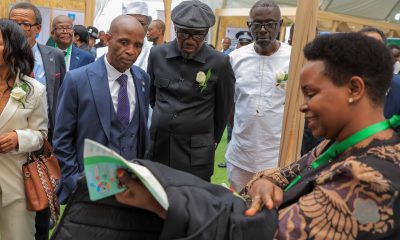
 Agriculture & Environment1 week ago
Agriculture & Environment1 week agoHow transformative education is shaping Africa’s next generation of innovators
-
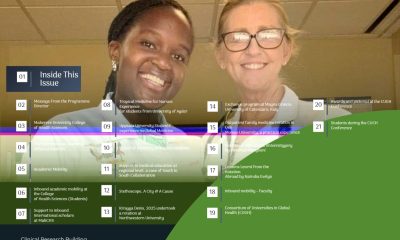
 Health2 weeks ago
Health2 weeks agoInternational Coordination Office Newsletter, Issue 1 Jan–Jun 2025
